Julius Caesar
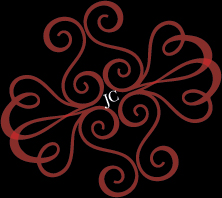
INTRODUCTION TO JULIUS CAESAR
Julius Caesar is one of Shakespeare’s most quoted plays: even those unfamiliar with the story know lines like “Cowards die many times before their deaths/The valiant never taste of death but once” (II.ii.32–33), or “Friends, Romans, countrymen, lend me your ears” (III.ii.73–74), or at the very least, Caesar’s famous last words, “Et tu, Brutè” (III.i.77)?
Julius Caesar is a tragedy set at a key moment in history: Caesar’s death also marks the death of the Roman republic and the birth of the Roman Empire. Up to this point, elected representatives and other politicians had governed Rome. As the empire expanded, however, the military gained more political sway, and generals and other military leaders began fighting amongst themselves for control. Eventually this erupted into civil war, from which Caesar eventually emerged as the unchallenged ruler of Rome.
As the play opens, Caesar has just returned from his recent victory against Pompey the Great, who had previously controlled Rome. Upon his homecoming the common people welcome him loudly, but many of the politicians and other powerful figures are wary of Caesar and fear his ambition. It is from these tensions that the play’s main events unfold.
Shakespeare’s audiences would have been familiar with the historical tale of Caesar’s assassination, and would have known what to expect. Shakespeare highlights this dramatic irony, where the audience can see the tragedy unfolding well before the characters do, by playing with themes of superstition and destiny, as most famously illustrated by the character of the Soothsayer, the old fortune-teller who warns Caesar of his impending doom in the very first act of the play. To the same end, Shakespeare presents neither side of the conflict as the “villain” of the tale, but prefers to show how good men can become victims of their own pride and poor decisions.
DRAMATIS PERSONAE

JULIUS CAESAR

CALPURNIA, Caesar’s wife

MARK ANTONY, triumvir after Caesar’s death

OCTAVIUS CAESAR, triumvir after Caesar’s death

MARCUS BRUTUS

CAIUS CASSIUS

CASCA, conspirator

DECIUS BRUTUS, conspirator

CINNA, conspirator

METELLUS CIMBER, conspirator

TREBONIUS, conspirator

CICERO, senator

PUBLIUS, senator

POPILIUS LENA, senator

SOOTHSAYER

ARTEMIDORUS, a teacher of rhetoric

CINNA, a poet

LUCILIUS, soldier in Brutus’s and Cassius’s army

TITINIUS, soldier in Brutus’s and Cassius’s army

MESSALA, soldier in Brutus’s and Cassius’s army

YOUNG CATO, soldier in Brutus’s and Cassius’s army

VARRO, soldier in Brutus’s and Cassius’s army

VOLUMNIUS, soldier in Brutus’s and Cassius’s army

CLAUDIUS, soldier in Brutus’s and Cassius’s army

CLITUS, soldier in Brutus’s and Cassius’s army

DARDANIUS, soldier in Brutus’s and Cassius’s army

PINDARUS, Cassius’s servant

LUCIUS, Brutus’s servant

STRATO, Brutus’s servant

Caesar’s SERVANT
Not Pictured
LEPIDUS
CAIUS LIGARIUS, conspirator
PORTIA, Brutus’s wife
FLAVIUS, tribune of the people
MARULLUS, tribune of the people
Another POET
LABEO, soldier in Brutus’s and Cassius’s army
FLAVIUS, soldier in Brutus’s and Cassius’s army
Antony’s SERVANT
Octavius’s SERVANT
CARPENTER
COBBLER
Five PLEBEIANS
Three SOLDIERS in Brutus’s army
Two SOLDERS in Antony’s army
MESSENGER
Senators, Plebeians, Officers, Soldiers, and Attendants
ACT I. Scene II (12–25).
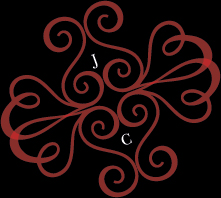
Rome is bustling with activity as the people fill the streets to celebrate the Festival of Lupercal. Caesar and his train wait to watch young Mark Antony run the course: Caesar has just finished giving Antony some last-minute advice before sending him on his way.
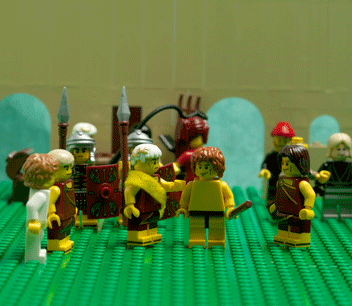
CAESAR
Set on, and leave no ceremony out.
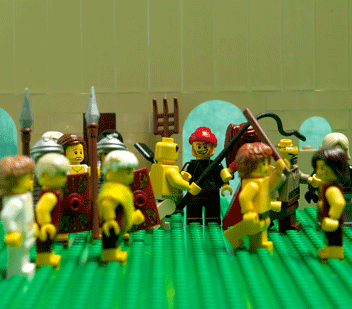
SOOTHSAYER
Caesar!
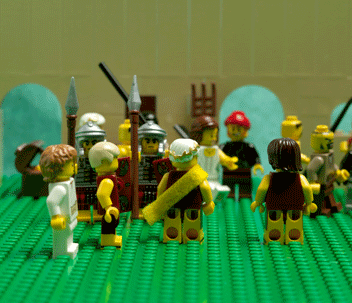
CAESAR
Ha! Who calls?
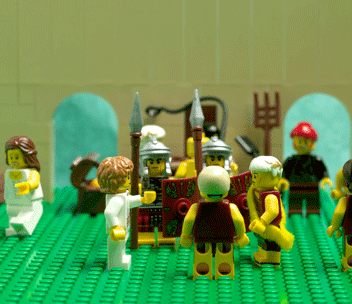
CASCA
Bid every noise be still. Peace yet again!
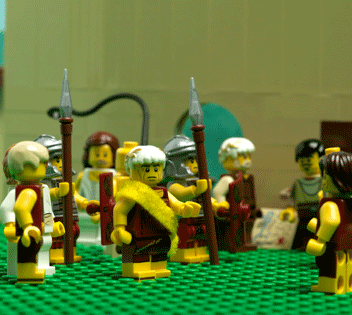
CAESAR
Who is it in the press that calls on me?
I hear a tongue shriller than all the music
Cry “Caesar!” Speak. Caesar is turned to hear.
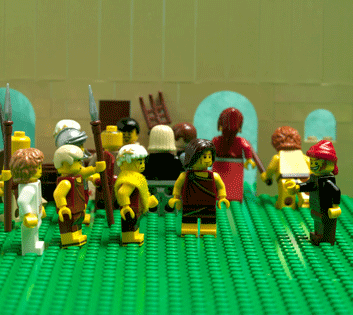
SOOTHSAYER
Beware the ides of March.
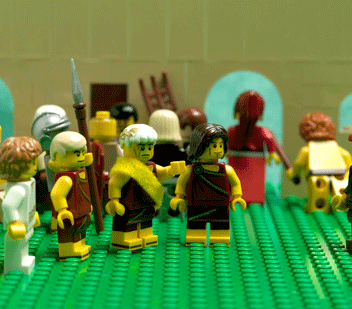
CAESAR
What man is that?
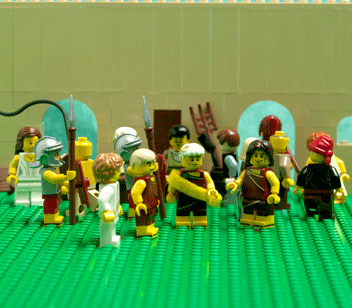
BRUTUS
A soothsayer bids you beware the ides of March.
CAESAR
Set him before me. Let me see his face.
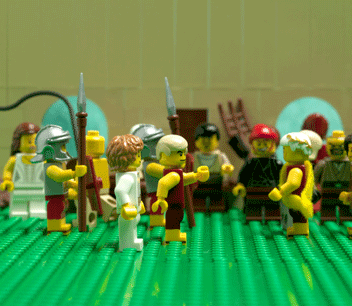
CASSIUS
Fellow, come from the throng. Look upon Caesar.
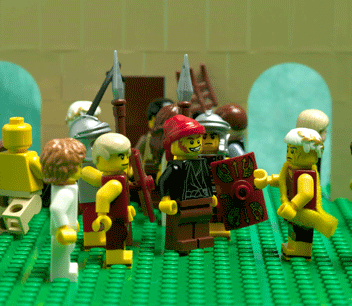
CAESAR
What say’st thou to me now? Speak once again.
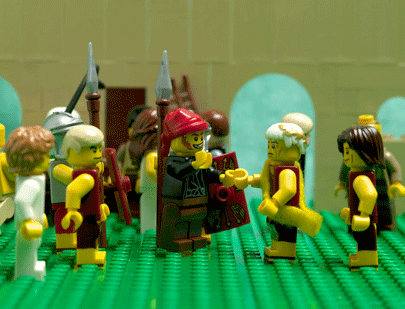
SOOTHSAYER
Beware the ides of March.
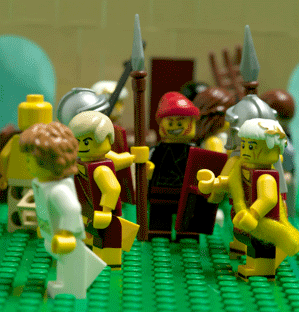
CAESAR
He is a dreamer. Let us leave him. Pass.
ACT I. Scene II (80–190).

Caesar and his party continue on to watch the festivities, but Brutus stays behind. Cassius joins him and takes the opportunity to speak with him about Caesar. Shouting in the distance, in the direction that Caesar has gone, interrupts their conversation.
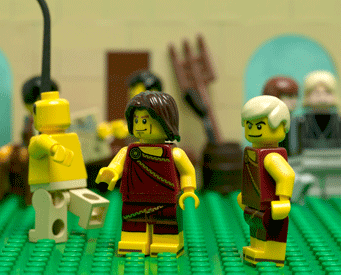
BRUTUS
What means this shouting? I do fear the people
Choose Caesar for their king.
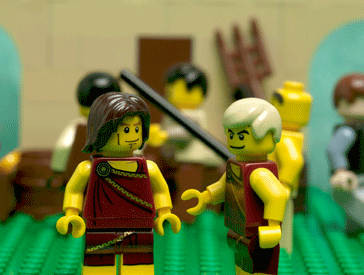
CASSIUS
Ay, do you fear it?
Then must I think you would not have it so.
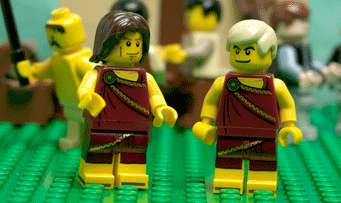
BRUTUS
I would not, Cassius, yet I love him well.
But wherefore do you hold me here so long?
What is it that you would impart to me?
If it be aught toward the general good,
Set honor in one eye and death i’th’other
And I will look on both indifferently;
For let the gods so speed me as I love
The name of honor more than I fear death.
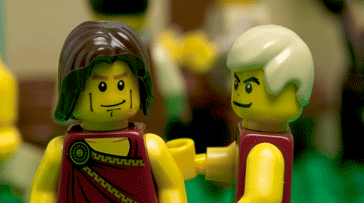
CASSIUS
I know that virtue to be in you, Brutus,
As well as I do know your outward favor.
Well, honor is the subject of my story.
I cannot tell what you and other men
Think of this life; but, for my single self,
I had as lief not be as live to be
In awe of such a thing as I myself.
I was born free as Caesar, so were you;
We both have fed as well, and we can both
Endure the winter’s cold as well as he.
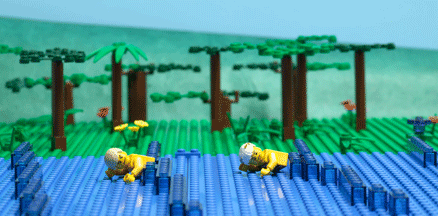
CASSIUS (cont.)
For once, upon a raw and gusty day,
The troubled Tiber chafing with her shores,
Caesar said to me, “Dar’st thou, Cassius, now
Leap in with me into this angry flood
And swim to yonder point?” Upon the word,
Accoutred as I was, I plungèd in
And bade him follow; so indeed he did.
The torrent roared, and we did buffet it
With lusty sinews, throwing it aside
And stemming it with hearts of controversy.
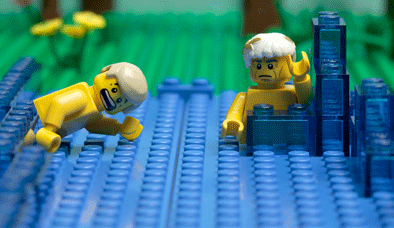
CASSIUS (cont.)
But ere we could arrive the point proposed,
Caesar cried, “Help me, Cassius, or I sink!”
Ay, as Aeneas, our great ancestor,
Did from the flames of Troy upon his shoulder
The old Anchises bear, so from the waves of Tiber
Did I the tirèd Caesar.
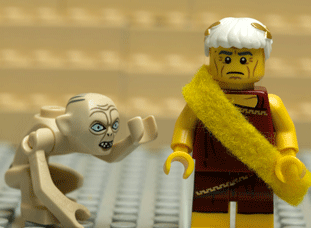
CASSIUS (cont.)
And this man
Is now become a god, and Cassius is
A wretched creature and must bend his body
If Caesar carelessly but nod on him.
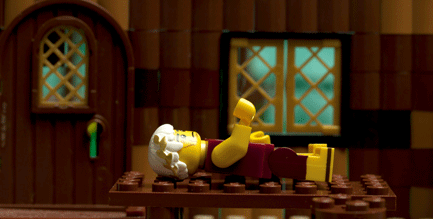
CASSIUS (cont.)
He had a fever when he was in Spain,
And when the fit was on him I did mark
How he did shake. ’Tis true, this god did shake!
His coward lips did from their color fly,
And that same eye whose bend doth awe the world
Did lose his luster. I did hear him groan.
Ay, and that tongue of his that bade the Romans
Mark him and write his speeches in their books,
Alas, it cried, “Give me some drink, Titinius,”
As a sick girl.
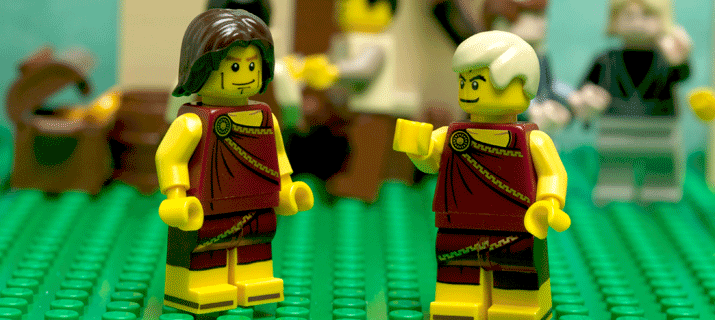
CASSIUS (cont.)
Ye gods, it doth amaze me
A man of such a feeble temper should
So get the start of the majestic world
And bear the palm alone.
****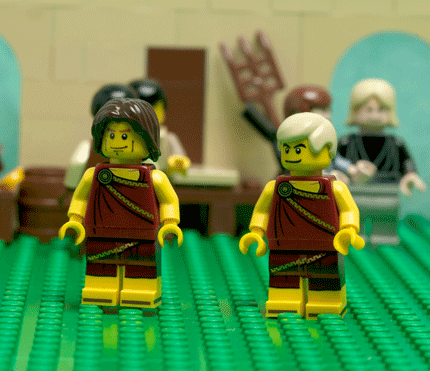
BRUTUS
Another general shout!
I do believe that these applauses are
For some new honors that are heaped on Caesar.
CASSIUS
Why, man, he doth bestride the narrow world
like a Colossus, and we petty men
Walk under his huge legs and peep about
To find ourselves dishonorable graves.
Men at some time are masters of their fates.
The fault, dear Brutus, is not in our stars,
But in ourselves, that we are underlings.
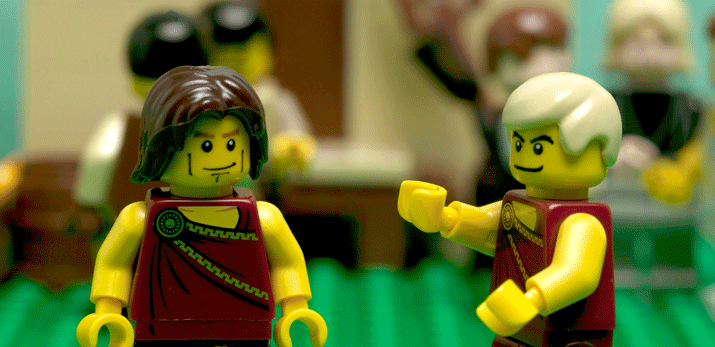
CASSIUS (cont.)
“Brutus” and “Caesar.” What should be in that “Caesar”?
Why should that name be sounded more than yours?
Write them together, yours is as fair a name;
Sound them, it doth become the mouth as well;
Weigh them, it is as heavy; conjure with ’em,
“Brutus” will start a spirit as soon as “Caesar.”
Now, in the names of all the gods at once,
Upon what meat doth this our great Caesar feed
That he is grown so great? Age, thou art shamed!
Rome, thou hast lost the breed of noble bloods!
When went there by an age since the great flood
But it was famed with more than with one man?
When could they say, till now, that talked of Rome,
That her wide walks encompassed but one man?
Now is it Rome indeed, and room enough,
When there is in it but one only man.
O, you and I have heard our fathers say
There was a Brutus once that would have brooked
Th’eternal devil to keep his state in Rome
As easily as a king.
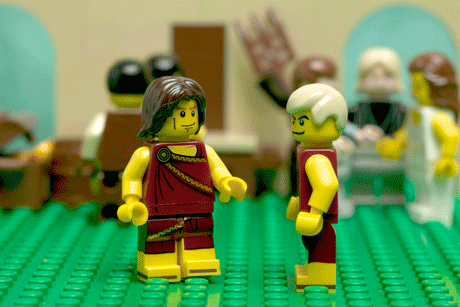
BRUTUS
That you do love me, I am nothing jealous.
What you would work me to, I have some aim.
How I have thought of this and of these times
I shall recount hereafter. For this present,
I would not, so with love I might entreat you,
Be any further moved. What you have said
I will consider; what you have to say
I will with patience hear and find a time
Both meet to hear and answer such high things.
Till then, my noble friend, chew upon this:
Brutus had rather be a villager
Than to repute himself a son of Rome
Under these hard conditions as this time
Is like to lay upon us.
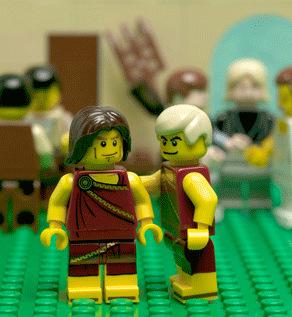
CASSIUS
I am glad that my weak words
Have struck but thus much show of fire from
Brutus.
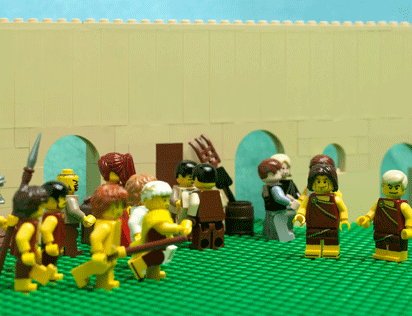
BRUTUS
The games are done, and Caesar is returning.
CASSIUS
As they pass by, pluck Casca by the sleeve;
And he will, after his sour fashion, tell you
What hath proceeded worthy note today.
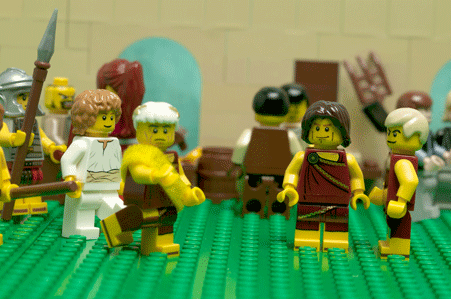
BRUTUS
I will do so. But look you, Cassius,
The angry spot doth glow on Caesar’s brow,
And all the rest look like a chidden train.
Calpurnia’s cheek is pale, and Cicero
Looks with such ferret and such fiery eyes
As we have seen him in the Capitol,
Being crossed in conference by some senators.
CASSIUS
Casca will tell us what the matter is.
ACT I. Scene II (216–296).

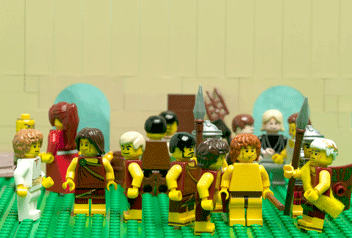
CASCA
You pulled me by the cloak. Would
you speak with me?
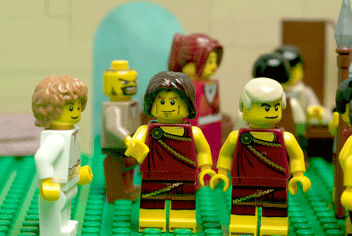
BRUTUS
Aye, Casca. Tell us what hath chanced today,
That Caesar looks so sad.
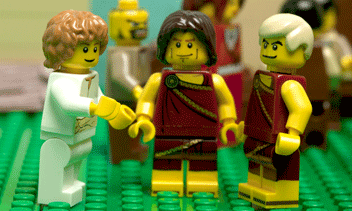
CASCA
Why? You were with him, were you not?
BRUTUS
I should not then ask Casca what had chanced.
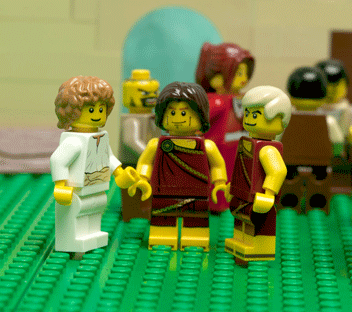
CASCA
Why, there was a crown offered him; and, being
offered him, he put it by with the back of his hand,
thus, and then the people fell a-shouting.
BRUTUS
What was the second noise for?
CASCA
Why, for that too.
CASSIUS
They shouted thrice. What was the last cry for?
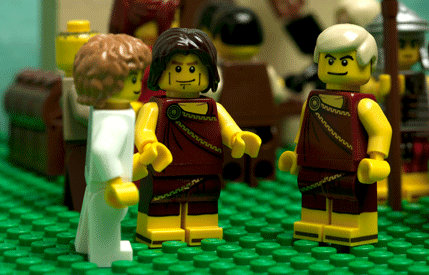
CASCA
Why, for that too.
BRUTUS
Was the crown offered him thrice?
CASCA
Ay, marry, was’t, and he put it by thrice, every time
gentler than other, and at every putting-by mine
honest neighbors shouted.
CASSIUS
Who offered him the crown?
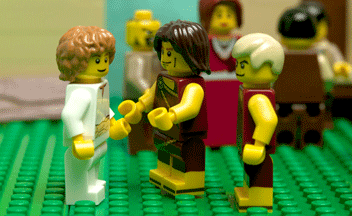
CASCA
Why, Antony.
BRUTUS
Tell us the manner of it, gentle Casca.
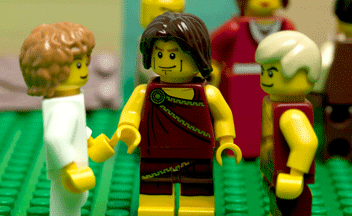
CASCA
I can as well be hanged as tell the manner of it. It was
mere foolery. I did not mark it;
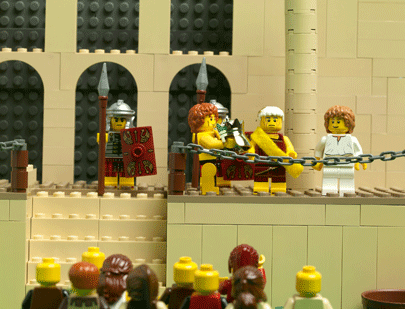
CASCA (cont.)
I saw Mark Antony
offer him a crown—yet, ’twas not a crown neither,
’twas one of these coronets—and, as I told you, he put
it by once; but for all that, to my thinking, he would fain
have had it. Then he offered it to him again; then he put it
by again; but to my thinking he was very loath to lay his
fingers off it. And then he offered it the third time.
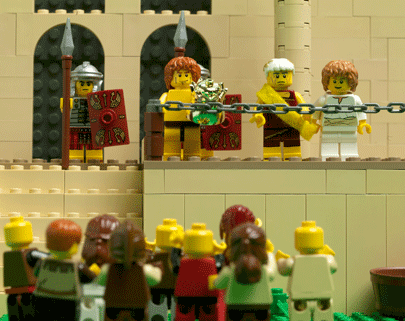
CASCA (cont.)
He put it the third time by, and, still as he refused it the rabblement hooted and clapped their chapped hands, and threw up their sweaty nightcaps, and uttered such a deal of stinking breath because Caesar refused the crown that it had almost choked Caesar, for he swooned and fell down at it. And for mine own part I durst not laugh for fear of opening my lips and receiving the bad air.
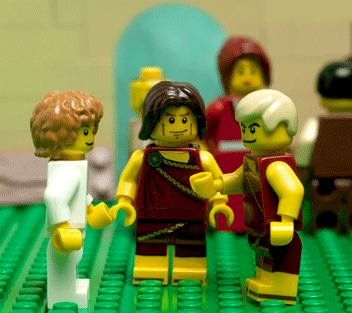
CASSIUS
But soft, I pray you. What, did Caesar swoon?
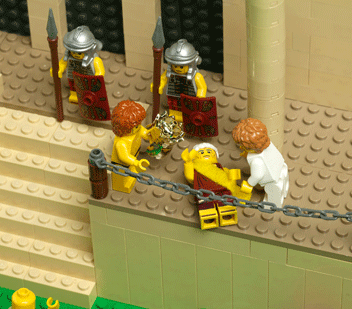
CASCA
He fell down in the marketplace, and foamed at
mouth, and was speechless.
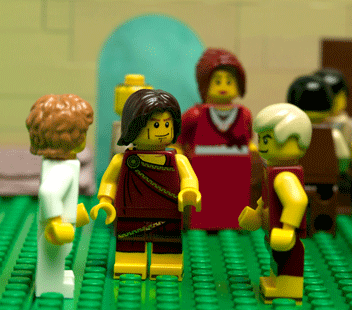
BRUTUS
’Tis very like. He hath the falling sickness.
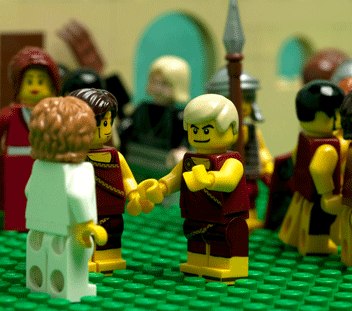
CASSIUS
No, Caesar hath it not, but you and I,
And honest Casca, we have the falling sickness.
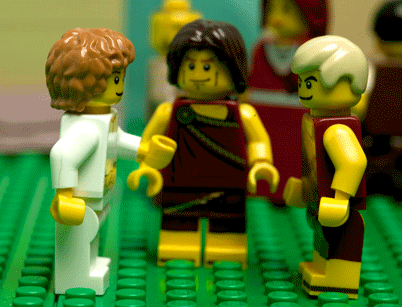
CASCA
I know not what you mean by that, but I am sure Caesar fell down. If the tag-rag people did not clap him and hiss him, according as he pleased and displeased them, as they use to do the players in the theater, I am no true man.
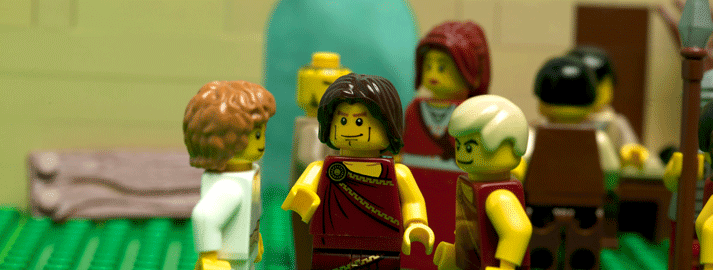
BRUTUS
What said he when he came unto himself?
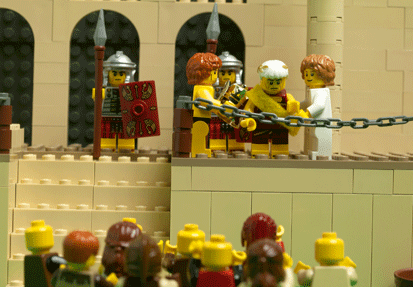
CASCA
Marry, before he fell down, when he perceived the common herd was glad he refused the crown, he plucked me ope his doublet and offered them his throat to cut. An I had been a man of any occupation, if I would not have taken him at a word, I would I might go to hell among the rogues. And so he fell. When he came to himself again, he said if he had done or said anything amiss, he desired Their Worships to think it was his infirmity. Three or four wenches where I stood cried “Alas, good soul!” and forgave him with all their hearts. But there’s no heed to be taken of them; if Caesar had stabbed their mothers they would have done no less.
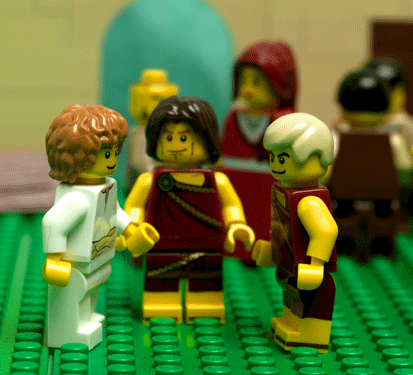
BRUTUS
And after that, he came thus sad away?
CASCA
Ay.
CASSIUS
Did Cicero say anything?
CASCA
Ay, he spoke Greek.
CASSIUS
To what effect?
CASCA
Nay, an I tell you that, I’ll ne’er look you i’th’ face again. But those that understood him smiled at one another and shook their heads; but, for mine own part, it was Greek to me. I could tell you more news too. Marullus and Flavius, for pulling scarves off Caesar’s images, are put to silence. Fare you well. There was more foolery yet, if I could remember it.
ACT I. Scene II (310–324).

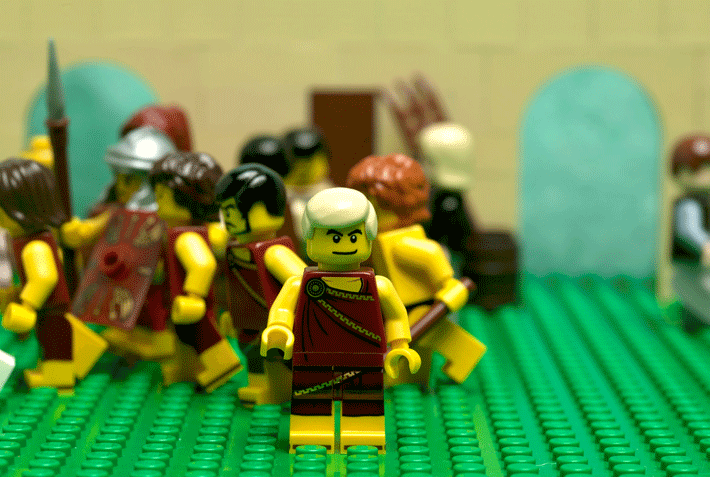
CASSIUS
Well, Brutus, thou art noble. Yet I see
Thy honorable metal may be wrought
From that it is disposed. Therefore it is meet
That noble minds keep ever with their likes;
For who so firm that cannot be seduced?
Caesar doth bear me hard, but he loves Brutus.
If I were Brutus now, and he were Cassius,
He should not humor me. I will this night
In several hands in at his windows throw,
As if they came from several citizens,
Writings, all tending to the great opinion
That Rome holds of his name, wherein obscurely
Caesar’s ambition shall be glancèd at.
And after this let Caesar seat him sure,
For we will shake him, or worse days endure.
ACT I. Scene III (1–41).

A strange day in Rome is followed by an even stranger night . . .
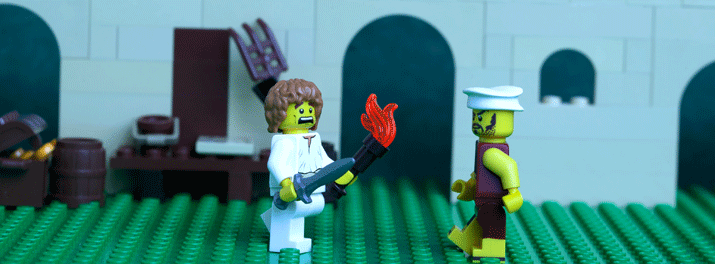
CICERO
Good even, Casca. Brought you Caesar home?
Why are you breathless? And why stare you so?
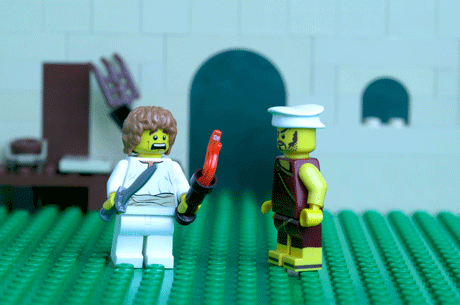
CASCA
Are not you moved, when all the sway of earth
Shakes like a thing unfirm? O Cicero,
I have seen tempests when the scolding winds
Have rived the knotty oaks, and I have seen
Th’ambitious ocean swell and rage and foam
To be exalted with the threat’ning clouds;
But never till tonight, never till now,
Did I go through a tempest dropping fire.
Either there is a civil strife in heaven,
Or else the world, too saucy with the gods,
Incenses them to send destruction.
CICERO
Why, saw you anything more wonderful?
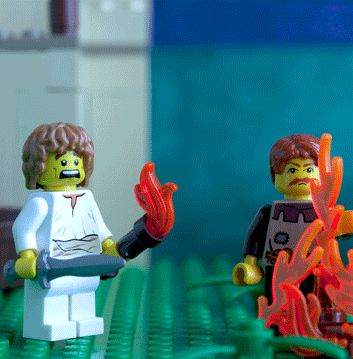
CASCA
A common slave—you know him well by sight—
Held up his left hand, which did flame and burn
Like twenty torches joined, and yet his hand,
Not sensible of fire, remained unscorched.
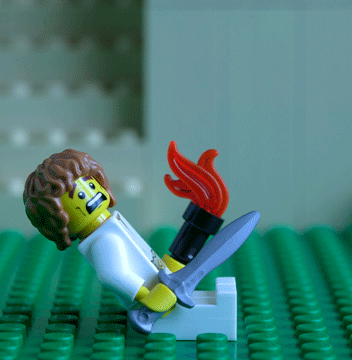
CASCA (cont.)
Besides—I ha’ not since put up my sword—
Against the Capitol I met a lion,
Who glazed upon me and went surly by
Without annoying me. And there were drawn
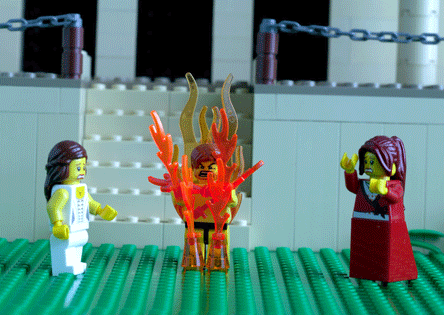
CASCA (cont.)
Upon a heap a hundred ghastly women,
Transformèd with their fear, who swore they saw
Men all in fire walk up and down the streets.
And yesterday the bird of night did sit
Even at noonday upon the marketplace,
Hooting and shrieking. When these prodigies
Do so conjointly meet, let not men say,
“These are their reasons, they are natural,”
For I believe they are portentous things
Unto the climate that they point upon.
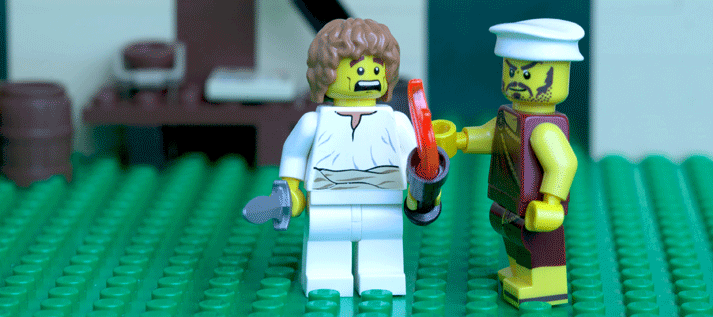
CICERO
Indeed, it is a strange-disposèd time.
But men may construe things after their fashion,
Clean from the purpose of the things themselves.
Come Caesar to the Capitol tomorrow?
CASCA
He doth; for he did bid Antonio
Send word to you he would be there tomorrow.
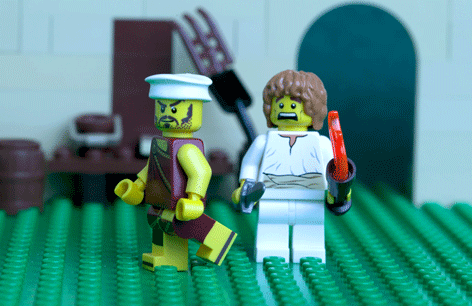
CICERO
Good night then, Casca. This disturbèd sky
Is not to walk in.
CASCA
Farewell, Cicero.
ACT II. Scene I (1–76).

Not all Romans are frightened by the unnatural events of the night. Casca soon comes upon Cassius, who claims it is “a very pleasing night to honest men” (I.iii.44). He soon convinces Casca to join him and his growing band of conspirators. They meet briefly with Cinna in the street, and Cassius enlists his help, instructing him to leave an anonymous note for Brutus encouraging him to act against Caesar, as Cassius has already done. They depart to meet and plot in secret with the other conspirators, under the cover of the strange weather that shakes the streets of Rome.
Meanwhile, Brutus has spent the evening in his garden, deep in thought about what to do about Caesar.
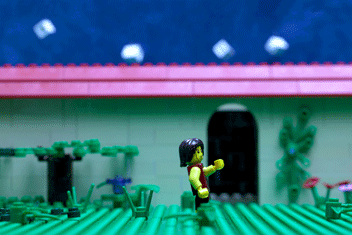
BRUTUS
What, Lucius, ho!—
I cannot by the progress of the stars
Give guess how near to day.—Lucius, I say!—
I would it were my fault to sleep so soundly.—
When, Lucius, when? Awake, I say! What, Lucius!
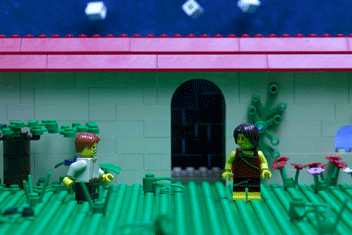
LUCIUS
Called you, my lord?
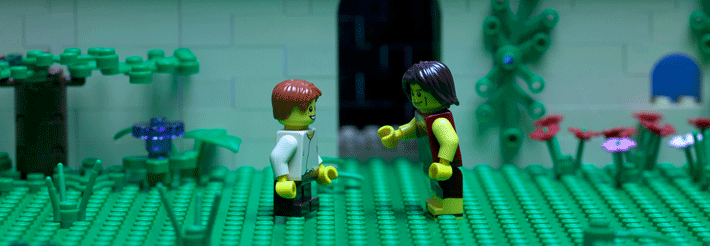
BRUTUS
Get me a taper in my study, Lucius.
When it is lighted, come and call me here.
LUCIUS
I will, my lord.

BRUTUS
It must be by his death. And for my part
I know no personal cause to spurn at him,
But for the general. He would be crowned.
How that might change his nature, there’s the question.
It is the bright day that brings forth the adder,
And that craves wary walking. Crown him—that—
And then I grant we put a sting in him
That at his will he may do danger with.
Th’abuse of greatness is when it disjoins
Remorse from power. And to speak truth of Caesar,
I have not known when his affections swayed
More than his reason. But ’tis a common proof
That lowliness is young ambition’s ladder,
Whereto the climber-upward turns his face;
But when he once attains the upmost round
He then unto the ladder turns his back,
Looks in the clouds, scorning the base degrees
By which he did ascend. So Caesar may.
Then, lest he may, prevent. And since the quarrel
Will bear no color for the thing he is,
Fashion it thus: that what he is, augmented,
Would run to these and these extremities;
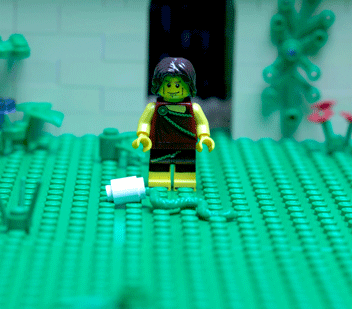
BRUTUS (cont.)
And therefore think him as a serpent’s egg
Which, hatched, would, as his kind, grow mischievous,
And kill him in the shell.
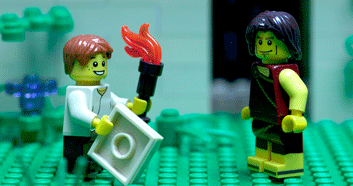
LUCIUS
The taper burneth in your closet, sir.
Searching the window for a flint, I found
This paper, thus sealed up, and I am sure
It did not lie there when I went to bed.
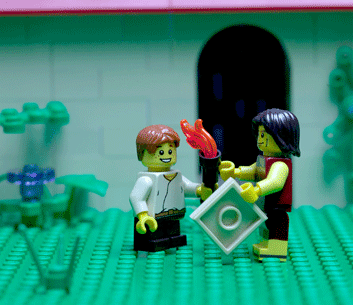
BRUTUS
Get you to bed again. It is not day.
Is not tomorrow, boy, the ides of March?
LUCIUS
I know not, sir.
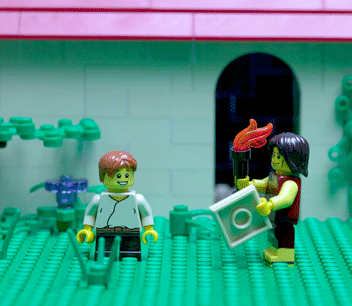
BRUTUS
Look in the calendar and bring me word.
LUCIUS
I will, sir.
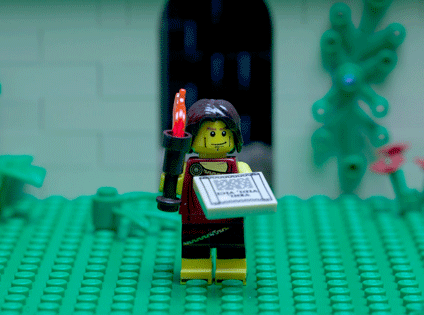
BRUTUS
The exhalations whizzing in the air
Give so much light that I may read by them.
“Brutus, thou sleep’st. Awake and see thyself!
Shall Rome, etc. Speak, strike, redress!”
“Brutus, thou sleep’st. Awake!”
Such instigations have been often dropped
Where I have took them up.
“Shall Rome, etc.” Thus must I piece it out:
Shall Rome stand under one man’s awe? What Rome?
My ancestors did from the streets of Rome
The Tarquin drive, when he was called a king.
“Speak, strike, redress!” Am I entreated
To speak and strike? O Rome, I make thee promise,
If the redress will follow, thou receivest
Thy full petition at the hand of Brutus!
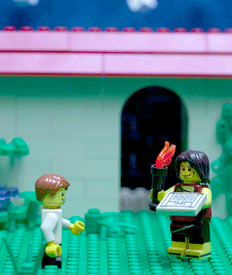
LUCIUS
Sir, March is wasted fifteen days.

BRUTUS
’Tis good. Go to the gate; somebody knocks.
Since Cassius first did whet me against Caesar,
I have not slept.
Between the acting of a dreadful thing
And the first motion, all the interim is
Like a phantasma or a hideous dream.
The genius and the mortal instruments
Are then in council; and the state of man,
Like to a little kingdom, suffers then
The nature of an insurrection.
LUCIUS
Sir, ’tis your brother Cassius at the door,
Who doth desire to see you.
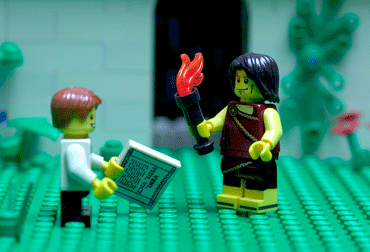
BRUTUS
Is he alone?
LUCIUS
No, sir. There are more with him.
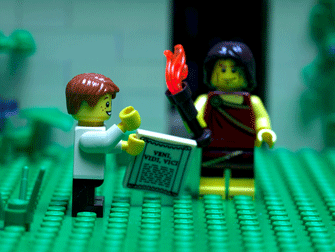
BRUTUS
Do you know them?
LUCIUS
No, sir. Their hats are plucked about their ears,
And half their faces buried in their cloaks,
That by no means I may discover them
By any mark of favor.
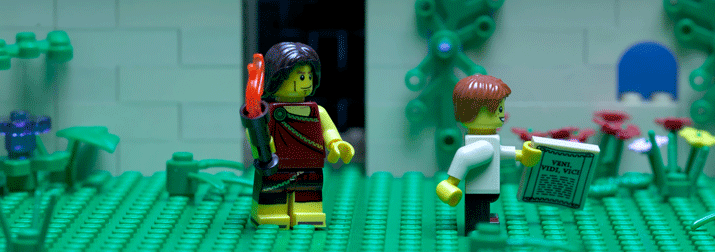
BRUTUS
Let ’em enter.
ACT II. Scene I (112–215).

Brutus invites the conspirators in, and after a few whispered words with Cassius, he calls the men together.
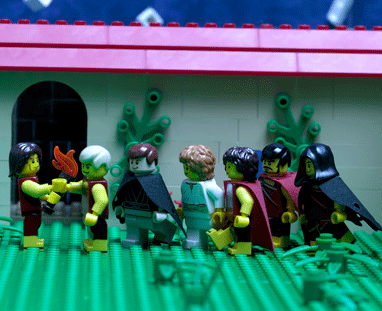
BRUTUS
Give me your hands all over, one by one.
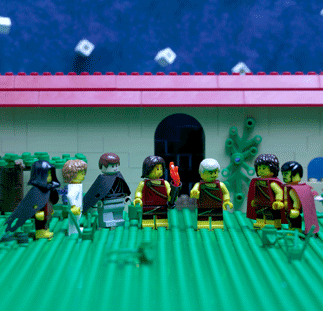
CASSIUS
And let us swear a resolution.
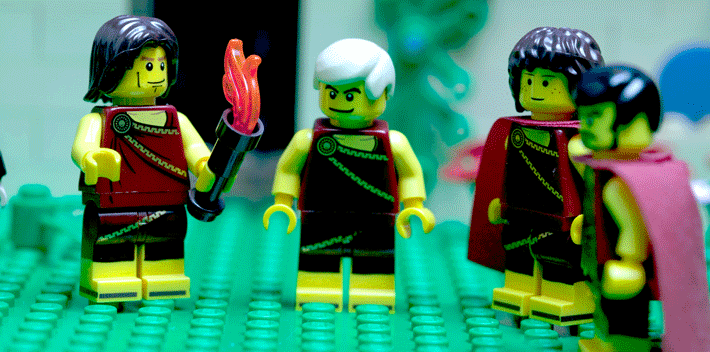
BRUTUS
No, not an oath. If not the face of men,
The sufferance of our souls, the time’s abuse—
If these be motives weak, break off betimes,
And every man hence to his idle bed;
So let high-sighted tyranny range on
Till each man drop by lottery. But if these,
As I am sure they do, bear fire enough
To kindle cowards and to steel with valor
The melting spirits of women, then, countrymen,
What need we any spur but our own cause
To prick us to redress? What other bond
Than secret Romans that have spoken the word
And will not palter? And what other oath
Than honesty to honesty engaged
That this shall be or we will fall for it?
Swear priests and cowards and men cautelous,
Old feeble carrions, and such suffering souls
That welcome wrongs; unto bad causes swear
Such creatures as men doubt. But do not stain
The even virtue of our enterprise,
Nor th’ insuppressive mettle of our spirits,
To think that or our cause or our performance
Did need an oath, where every drop of blood
That every Roman bears—and nobly bears—
Is guilty of a several bastardy
If he do break the smallest particle
Of any promise that hath passed from him.
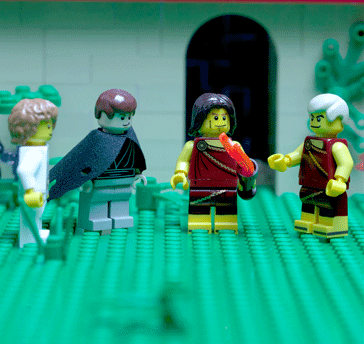
CASSIUS
But what of Cicero? Shall we sound him?
I think he will stand very strong with us.
CASCA
Let’s not leave him out.
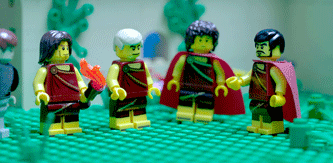
CINNA
No, by no means.
METELLUS
Oh, let us have him, for his silver hairs
Will purchase us a good opinion
And buy men’s voices to commend our deeds.
It shall be said his judgment ruled our hands;
Our youths and wildness shall no whit appear,
But all be buried in his gravity.
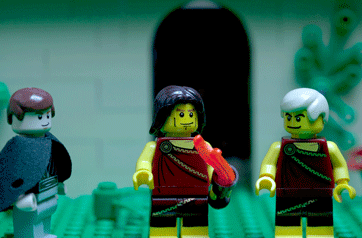
BRUTUS
Oh, name him not. Let us not break with him,
For he will never follow anything
That other men begin.
CASSIUS
Then leave him out.
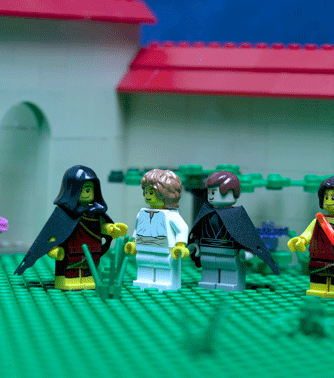
CASCA
Indeed he is not fit.
DECIUS
Shall no man else be touched but only Caesar?
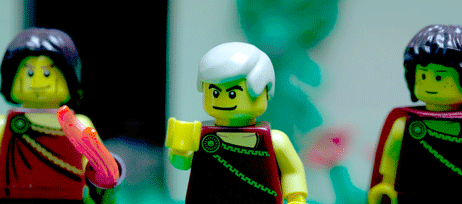
CASSIUS
Decius, well urged. I think it is not meet
Mark Antony, so well beloved of Caesar,
Should outlive Caesar. We shall find of him
A shrewd contriver; and you know his means,
If he improve them, may well stretch so far
As to annoy us all. Which to prevent,
Let Antony and Caesar fall together.
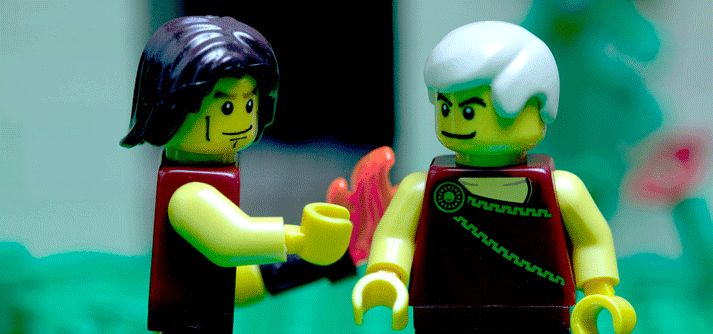
BRUTUS
Our course will seem too bloody, Caius Cassius,
To cut the head off and then hack the limbs,
Like wrath in death and envy afterwards;
For Antony is but a limb of Caesar.
Let’s be sacrificers, but not butchers, Caius.
We all stand up against the spirit of Caesar,
And in the spirit of men there is no blood.
Oh, that we then could come by Caesar’s spirit
And not dismember Caesar! But, alas,
Caesar must bleed for it. And, gentle friends,
Let’s kill him boldly, but not wrathfully;
Let’s carve him as a dish fit for the gods,
Not hew him as a carcass fit for hounds.
And let our hearts, as subtle masters do,
Stir up their servants to an act of rage
And after seem to chide ’em. This shall make
Our purpose necessary, and not envious;
Which so appearing to the common eyes,
We shall be called purgers, not murderers.
And for Mark Antony, think not of him;
For he can do no more than Caesar’s arm
When Caesar’s head is off.
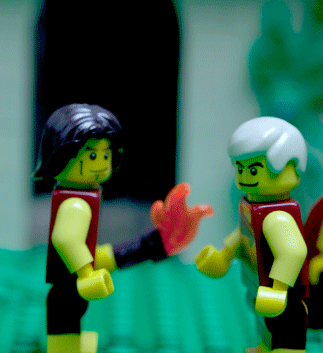
CASSIUS
Yet I fear him,
For the engrafted love he bears to Caesar—
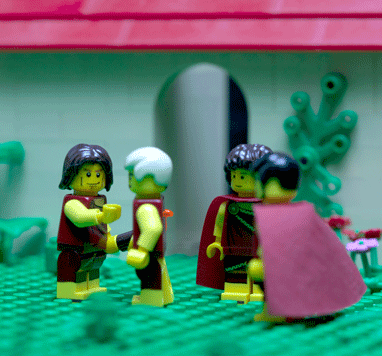
BRUTUS
Alas, good Cassius, do not think of him.
If he love Caesar, all that he can do
Is to himself—take thought and die for Caesar.
And that were much he should, for he is given
To sports, to wildness, and much company.
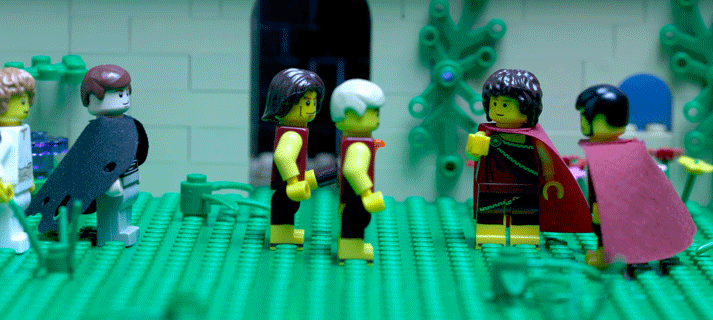
TREBONIUS
There is no fear in him. Let him not die,
For he will live, and laugh at this hereafter.
BRUTUS
Peace! Count the clock.
CASSIUS
The clock hath stricken three.
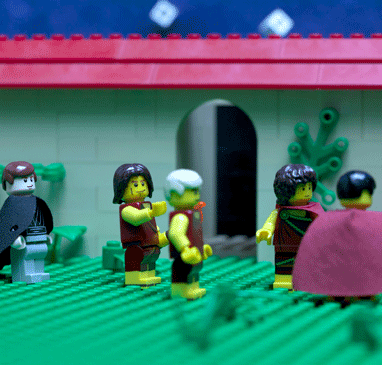
TREBONIUS
’Tis time to part.
CASSIUS
But it is doubtful yet
Whether Caesar will come forth today or no,
For he is superstitious grown of late,
Quite from the main opinion he held once
Of fantasy, of dreams, and ceremonies.
It may be these apparent prodigies,
The unaccustomed terror of this night,
And the persuasion of his augurers
May hold him from the Capitol today.
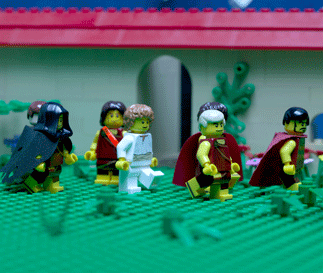
DECIUS
Never fear that. If he be so resolved,
I can o’ersway him; for he loves to hear
That unicorns may be betrayed with trees,
And bears with glasses, elephants with holes,
Lions with toils, and men with flatterers.
But when I tell him he hates flatterers,
He says he does, being then most flattered.
Let me work;
For I can give his humor the true bent,
And I will bring him to the Capitol.
CASSIUS
Nay, we will all of us be there to fetch him.
BRUTUS
By the eighth hour. Is that the uttermost?
CINNA
Be that the uttermost, and fail not then.
ACT II. Scene II (1–108).

After the conspirators leave, Brutus’s wife, Portia, begs him to tell her what is going on. He promises to confide in her when he has the time, but a latecomer, who wishes to join the conspiracy, interrupts him. They quickly depart to meet with the others, leaving Portia with her questions unanswered.
Caesar’s wife has also been disturbed in the night—not by noisy visitors, but by dark and threatening dreams.
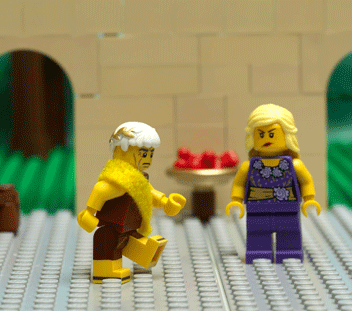
CAESAR
Nor heaven nor earth have been at peace tonight.
Thrice hath Calpurnia in her sleep cried out,
“Help, ho, they murder Caesar!”—Who’s within?
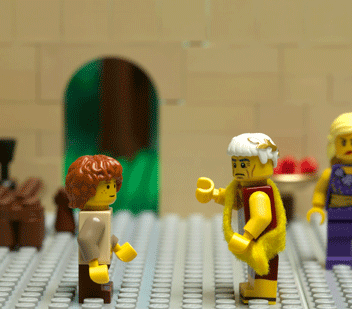
SERVANT
My lord?
CAESAR
Go bid the priests do present sacrifice
And bring me their opinions of success.
SERVANT
I will, my lord.
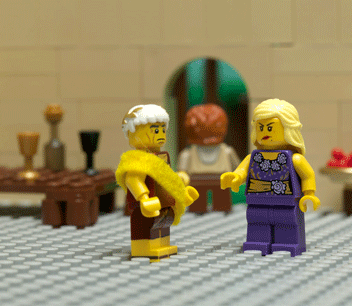
CALPURNIA
What mean you, Caesar? Think you to walk forth?
You shall not stir out of your house today.
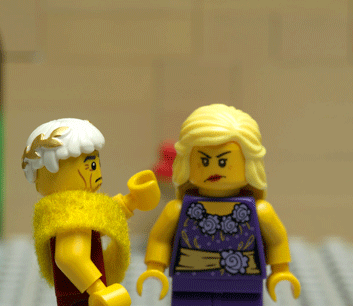
CAESAR
Caesar shall forth. The things that threatened me
Ne’er looked but on my back. When they shall see
The face of Caesar, they are vanishèd.
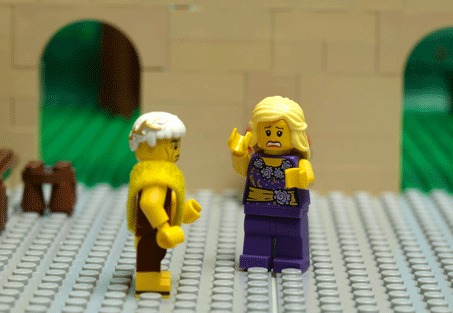
CALPURNIA
Caesar, I never stood on ceremonies,
Yet now they fright me. There is one within,
Besides the things that we have heard and seen,
Recounts most horrid sights seen by the watch.
A lioness hath whelpèd in the streets,
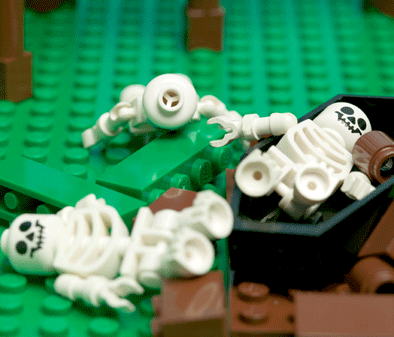
CALPURNIA (cont.)
And graves have yawned and yielded up their dead.

CALPURNIA (cont.)
Fierce fiery warriors fight upon the clouds
In ranks and squadrons and right form of war,
Which drizzled blood upon the Capitol.
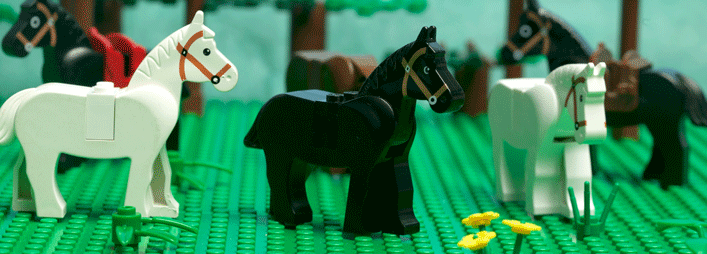
The noise of battle hurtled in the air;
Horses did neigh, and dying men did groan,
And ghosts did shriek and squeal about the streets.
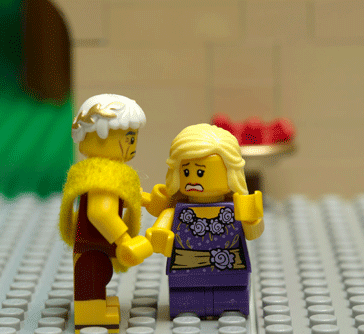
CALPURNIA (cont.)
O Caesar! These things are beyond all use,
And I do fear them.
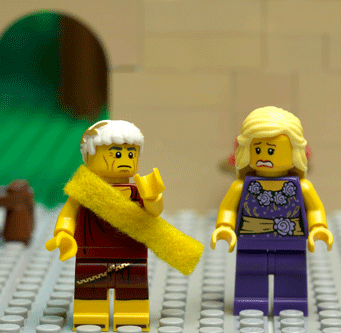
CAESAR
What can be avoided
Whose end is purposed by the mighty gods?
Yet Caesar shall go forth; for these predictions
Are to the world in general as to Caesar.

CALPURNIA
When beggars die there are no comets seen;
The heavens themselves blaze forth the death of princes.
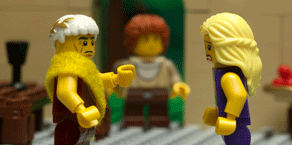
CAESAR
Cowards die many times before their deaths;
The valiant never taste of death but once.
Of all the wonders that I yet have heard,
It seems to me most strange that men should fear,
Seeing death, a necessary end,
Will come when it will come.
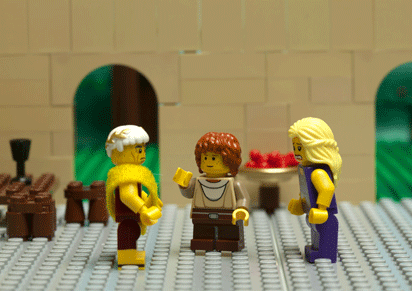
CAESAR (cont.)
What say the augurers?
SERVANT
They would not have you stir forth today.
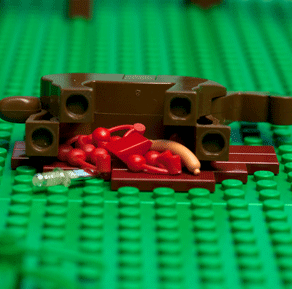
SERVANT (cont.)
Plucking the entrails of an offering forth,
They could not find a heart within the beast.
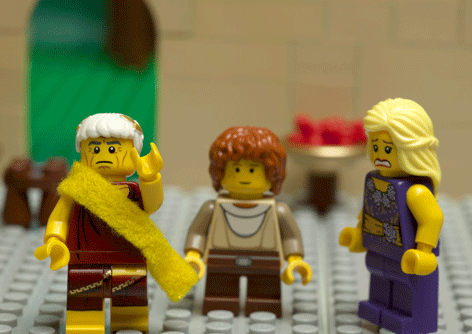
CAESAR
The gods do this in shame of cowardice.
Caesar should be a beast without a heart
If he should stay at home today for fear.
No, Caesar shall not. Danger knows full well
That Caesar is more dangerous than he.
We are two lions littered in one day,
And I the elder and more terrible;
And Caesar shall go forth.
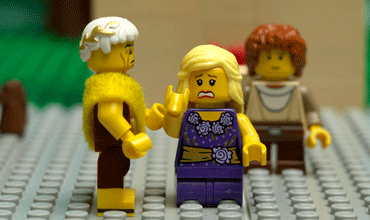
CALPURNIA
Alas, my lord,
Your wisdom is consumed in confidence.
Do not go forth today! Call it my fear
That keeps you in the house, and not your own.
We’ll send Mark Antony to the Senate House,
And he shall say you are not well today.
Let me, upon my knee, prevail in this.
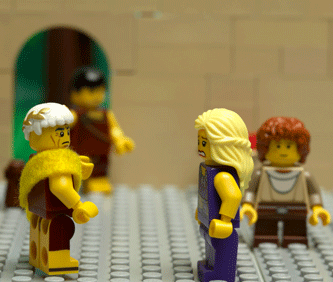
CAESAR
Mark Antony shall say I am not well,
And for thy humor I will stay at home.
Here’s Decius Brutus. He shall tell them so.
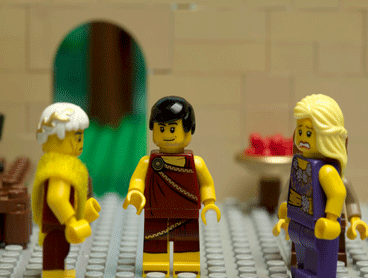
DECIUS
Caesar, all hail! Good morrow, worthy Caesar.
I come to fetch you to the Senate House.
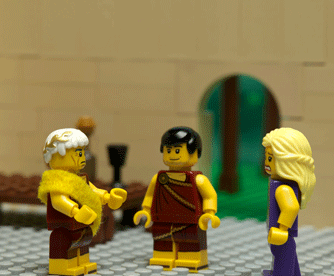
CAESAR
And you are come in very happy time
To bear my greeting to the senators
And tell them that I will not come today.
Cannot is false, and that I dare not, falser;
I will not come today. Tell them so, Decius.
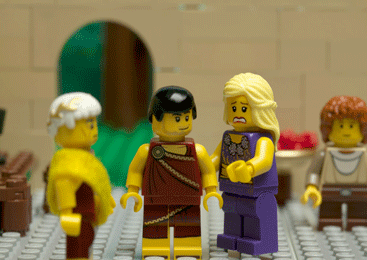
CALPURNIA
Say he is sick.
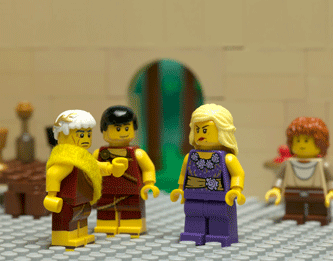
CAESAR
Shall Caesar send a lie?
Have I in conquest stretched mine arm so far
To be afeared to tell graybeards the truth?
Decius, go tell them Caesar will not come.
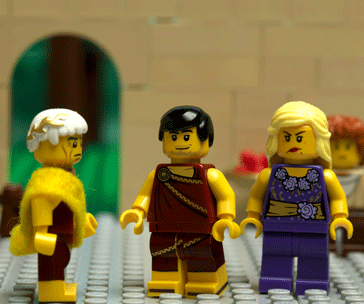
DECIUS
Most mighty Caesar, let me know some cause,
Lest I be laughed at when I tell them so.
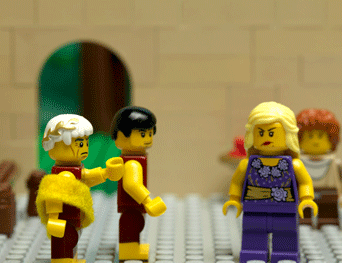
CAESAR
The cause is in my will: I will not come.
That is enough to satisfy the Senate.
But for your private satisfaction,
Because I love you, I will let you know.
Calpurnia here, my wife, stays me at home.
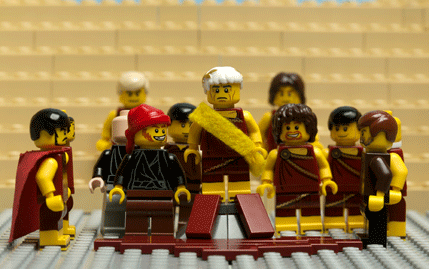
CAESAR (cont.)
She dreamt tonight she saw my statua,
Which like a fountain with an hundred spouts
Did run pure blood; and many lusty Romans
Came smiling and did bathe their hands in it.
And these does she apply for warnings and portents
Of evils imminent, and on her knee
Hath begged that I will stay at home today.
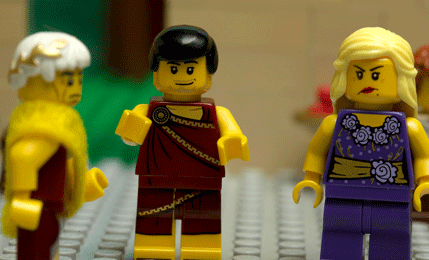
DECIUS BRUTUS
This dream is all amiss interpreted;
It was a vision fair and fortunate.
Your statue spouting blood in many pipes,
In which so many smiling Romans bathed,
Signifies that from you great Rome shall suck
Reviving blood, and that great men shall press
For tinctures, stains, relics, and cognizance.
This by Calpurnia’s dream is signified.
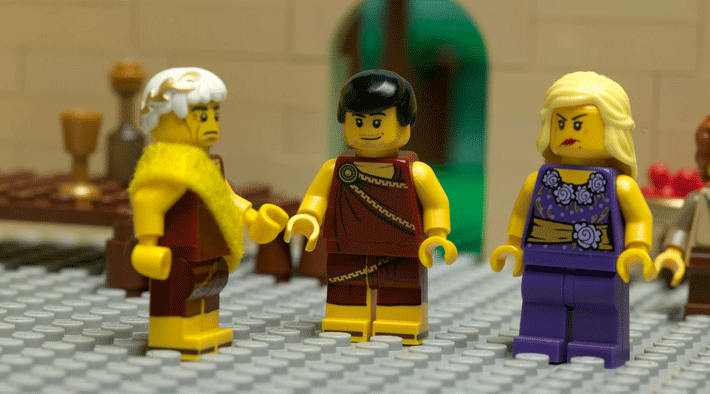
CAESAR
And this way have you well expounded it.
DECIUS BRUTUS
I have, when you have heard what I can say:
And know it now. The Senate have concluded
To give this day a crown to mighty Caesar.
If you shall send them word you will not come,
Their minds may change. Besides, it were a mock
Apt to be rendered, for someone to say
“Break up the senate till another time
When Caesar’s wife shall meet with better dreams.”
If Caesar hide himself, shall they not whisper
“Lo, Caesar is afraid”?
Pardon me, Caesar, for my dear dear love
To your proceeding bids me tell you this,
And reason to my love is liable.
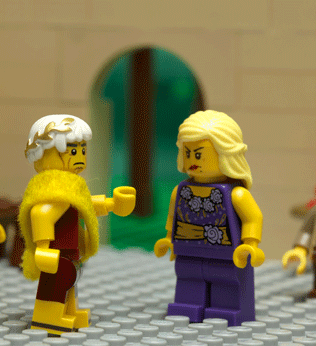
CAESAR
How foolish do your fears seem now, Calpurnia!
I am ashamèd I did yield to them.
Give me my robe, for I will go.
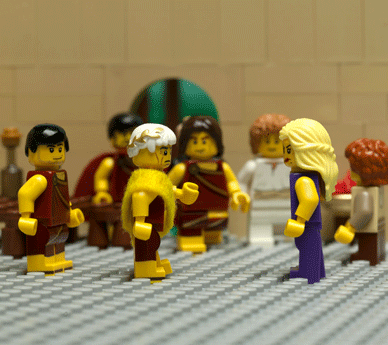
CAESAR (cont.)
And look where Publius is come to fetch me.
ACT III. Scene I (1–84).

As the conspirators escort the unsuspecting Caesar to the Senate, other forces are in motion to warn Caesar and stop the plot. A man, Artemidorus, has written a letter revealing everything and naming the conspirators. Portia, still uninformed of her husband’s plans, questions the soothsayer in the street as he passes by. He tells her he goes to warn Caesar, that he knows of no threat against him yet he fears it is so. Portia realizes what secret business has kept Brutus busy and sends their servant Lucius to the Senate to see how the endeavor has turned out. Meanwhile the conspirators prepare to strike.
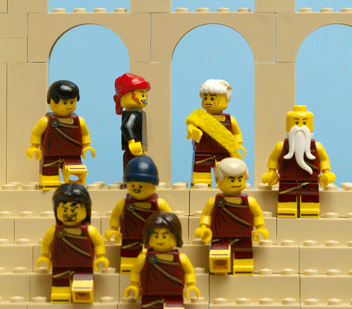
CAESAR
The ides of March are come.
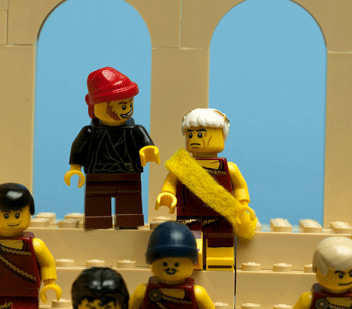
SOOTHSAYER
Ay, Caesar, but not gone.
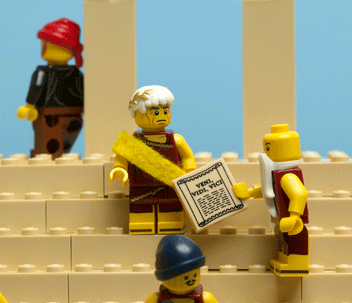
ARTEMIDORUS
Hail, Caesar! Read this schedule.
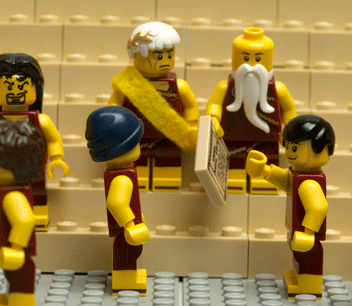
DECIUS BRUTUS
Trebonius doth desire you to o’erread,
At your best leisure, this his humble suit.
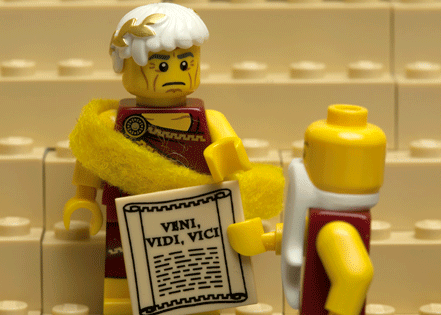
ARTEMIDORUS
O Caesar, read mine first, for mine’s a suit
That touches Caesar nearer. Read it, great Caesar.
CAESAR
What touches us ourself shall be last served.
ARTEMIDORUS
Delay not, Caesar, read it instantly.
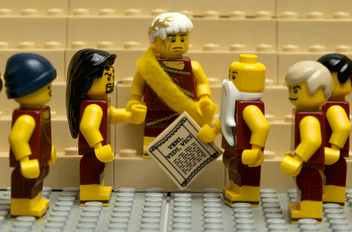
CAESAR
What, is the fellow mad?
PUBLIUS
Sirrah, give place.
CASSIUS
What, urge you your petitions in the street?
Come to the Capitol.
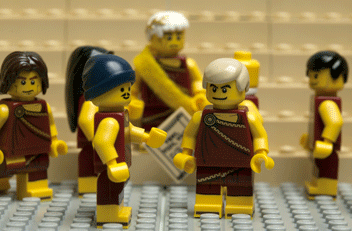
POPILIUS
I wish your enterprise today may thrive.
CASSIUS
What enterprise, Popilius?
POPILIUS
Fare you well.
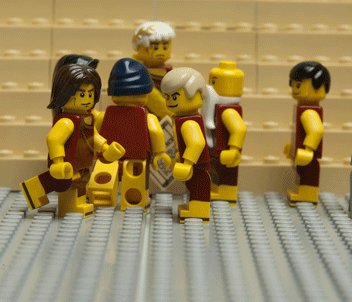
BRUTUS
What said Popilius Lena?
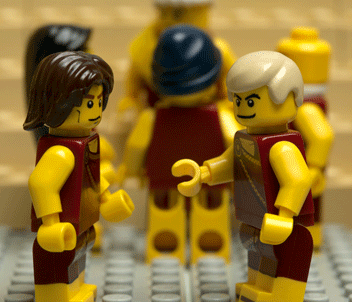
CASSIUS
He wished today our enterprise might thrive.
I fear our purpose is discoverèd.
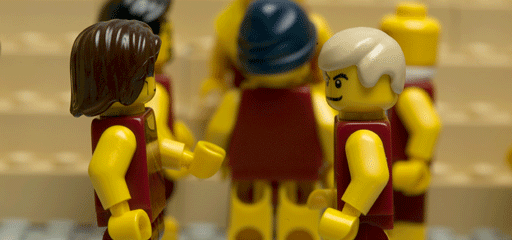
BRUTUS
Look, how he makes to Caesar. Mark him.
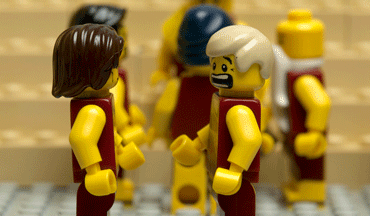
CASSIUS
Casca, be sudden, for we fear prevention.
Brutus, what shall be done? If this be known,
Cassius or Caesar never shall turn back,
For I will slay myself.
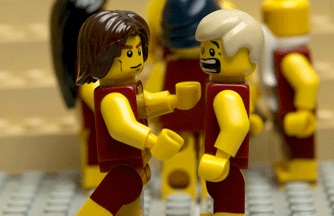
BRUTUS
Cassius, be constant.
Popilius Lena speaks not of our purposes;
For, look, he smiles, and Caesar doth not change.
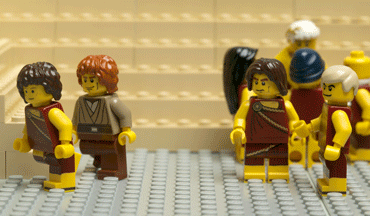
CASSIUS
Trebonius knows his time, for, look you, Brutus,
He draws Mark Antony out of the way.
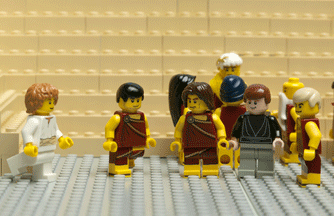
DECIUS BRUTUS
Where is Metellus Cimber? Let him go
And presently prefer his suit to Caesar.
BRUTUS
He is addressed. Press near and second him.
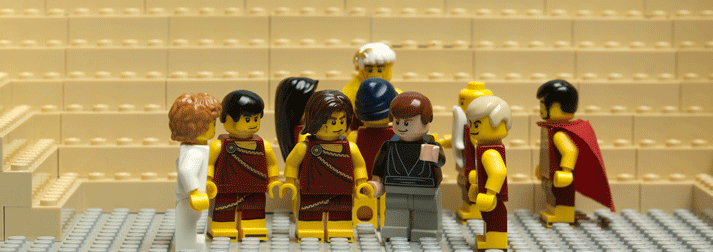
CINNA
Casca, you are the first that rears your hand.
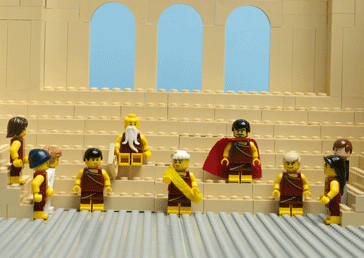
CAESAR
Are we all ready? What is now amiss
That Caesar and his Senate must redress?
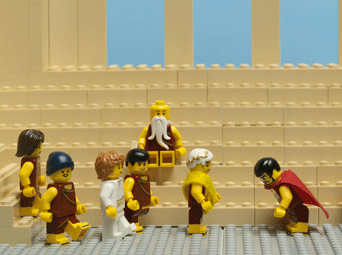
METELLUS CIMBER
Most high, most mighty, and most puissant Caesar,
Metellus Cimber throws before thy seat
An humble heart—
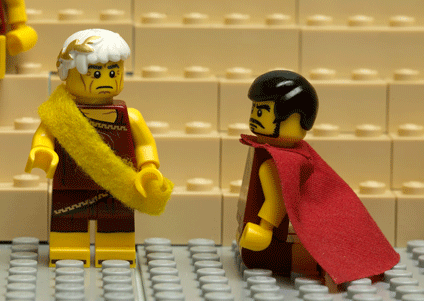
CAESAR
I must prevent thee, Cimber.
These couchings and these lowly courtesies
Might fire the blood of ordinary men,
And turn preordinance and first decree
Into the law of children. Be not fond,
To think that Caesar bears such rebel blood
That will be thaw’d from the true quality
With that which melteth fools; I mean, sweet words,
Low-crookèd curtsies, and base spaniel-fawning.
Thy brother by decree is banished.
If thou dost bend and pray and fawn for him,
I spurn thee like a cur out of my way.
Know, Caesar doth not wrong, nor without cause
Will he be satisfied.
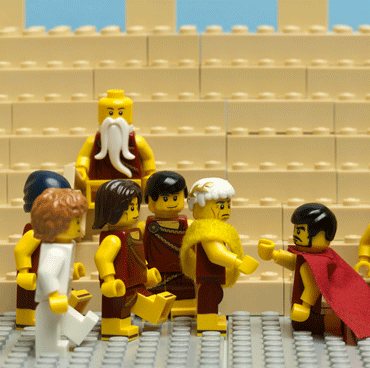
METELLUS CIMBER
Is there no voice more worthy than my own
To sound more sweetly in great Caesar’s ear
For the repealing of my banished brother?
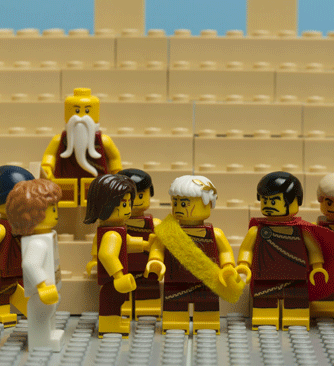
BRUTUS
I kiss thy hand, but not in flattery, Caesar,
Desiring thee that Publius Cimber may
Have an immediate freedom of repeal.
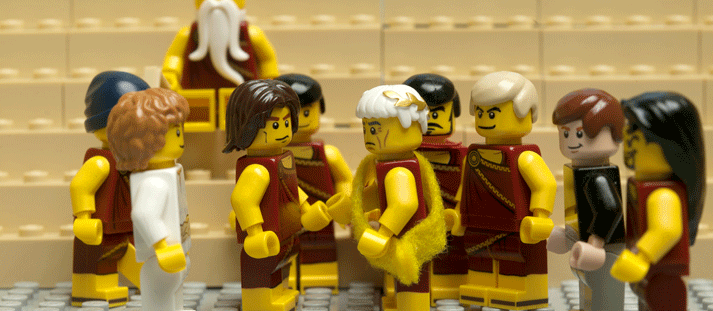
CAESAR
What, Brutus!
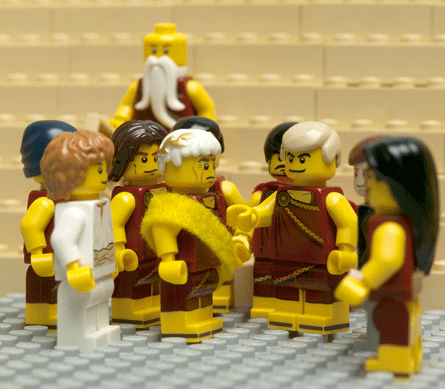
CASSIUS
Pardon, Caesar! Caesar, pardon!
As low as to thy foot doth Cassius fall,
To beg enfranchisement for Publius Cimber.
CAESAR
I could be well moved, if I were as you;
If I could pray to move, prayers would move me.
But I am constant as the northern star,
Of whose true-fixed and resting quality
There is no fellow in the firmament.
The skies are painted with unnumbered sparks;
They are all fire and every one doth shine;
But there’s but one in all doth hold his place.
So in the world: ’tis furnished well with men,
And men are flesh and blood, and apprehensive;
Yet in the number I do know but one
That unassailable holds on his rank,
Unshaked of motion. And that I am he,
Let me a little show it even in this:
That I was constant Cimber should be banished,
And constant do remain to keep him so.

CINNA
O Caesar—
CAESAR
Hence! Wilt thou lift up Olympus?
DECIUS BRUTUS
Great Caesar—
CAESAR
Doth not Brutus bootless kneel?
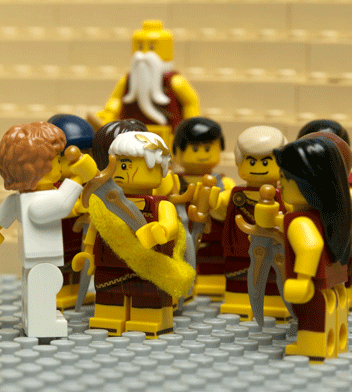
CASCA
Speak hands for me!
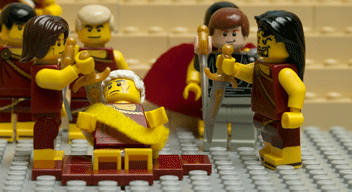
CAESAR
Et tu, Brutè? Then fall, Caesar!
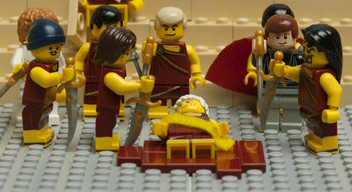
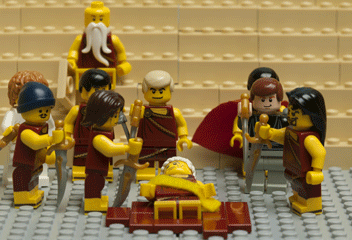
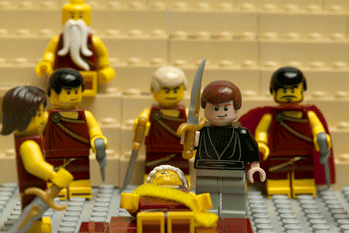
CINNA
Liberty! Freedom! Tyranny is dead!
Run hence, proclaim, cry it about the streets.
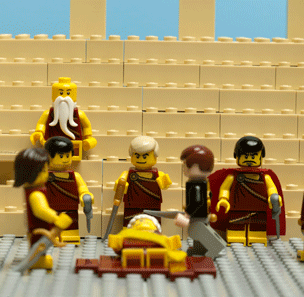
CASSIUS
Some to the common pulpits, and cry out
“Liberty, freedom, and enfranchisement!”
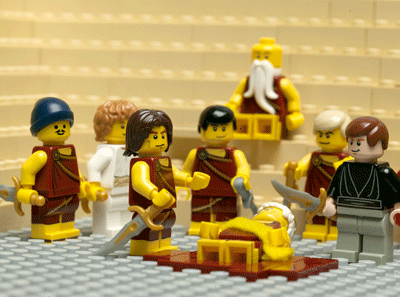
BRUTUS
People and senators, be not affrighted.
Fly not; stand still. Ambition’s debt is paid.
ACT III. Scene II (1–261).

The deed is done: Caesar is dead. There is a great deal of noise and confusion as some flee in fear and others run to spread the news. At Brutus’s suggestion, they then smear their hands and swords with Caesar’s blood: They plan, with no little irony, to go out into the streets and proclaim, “Peace, freedom, and liberty!”
Antony, who did not witness the slaying, sends a servant to the conspirators with his message: “Say I love Brutus, and I honor him/Say I feared Caesar, honored him, and loved him” (III.i.129–130). Brutus says they will not harm him, and so he comes to the Senate. He mourns Caesar and begs them to kill him, too. Brutus refuses and insists that once Antony knows the truth, he will agree that Caesar’s death was necessary. Antony shakes the bloody hands of all of the conspirators as a show of his friendship, but when he sees the mangled body of Caesar, he is again filled with grief. Brutus grants Antony his wish to speak at Caesar’s funeral, against Cassius’s advice.
The conspirators depart, and Antony stays to mourn over Caesar’s body. He is interrupted by a servant, sent from Caesar’s great-nephew, adopted son and heir Octavius Caesar, who has come to Rome at Caesar’s invitation. Antony warns that “Here is a mourning Rome, a dangerous Rome,/No Rome of safety for Octavius yet” (III.i.290–291) but says he plans to see how the people will react when he describes the murder in his funeral speech.
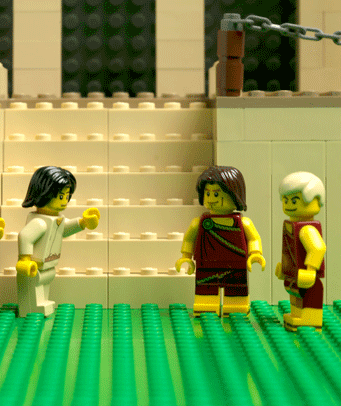
PLEBEIANS
We will be satisfied! Let us be satisfied!
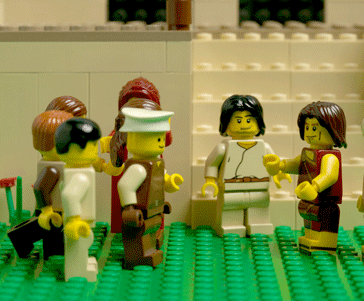
BRUTUS
Then follow me, and give me audience, friends.—
Cassius, go you into the other street
And part the numbers.
Those that will hear me speak, let ’em stay here;
Those that will follow Cassius, go with him;
And public reasons shall be renderèd
Of Caesar’s death.
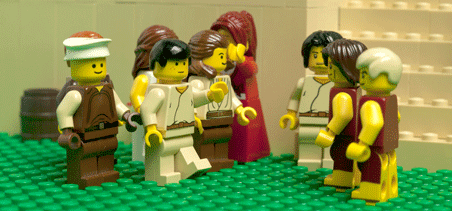
FIRST PLEBEIAN
I will hear Brutus speak.
SECOND PLEBEIAN
I will hear Cassius, and compare their reasons
When severally we hear them renderèd.
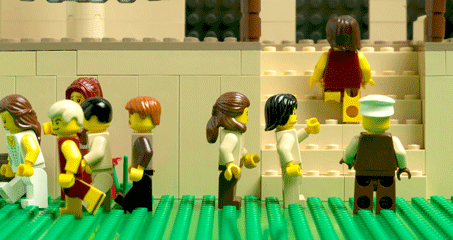
THIRD PLEBEIAN
The noble Brutus is ascended. Silence!
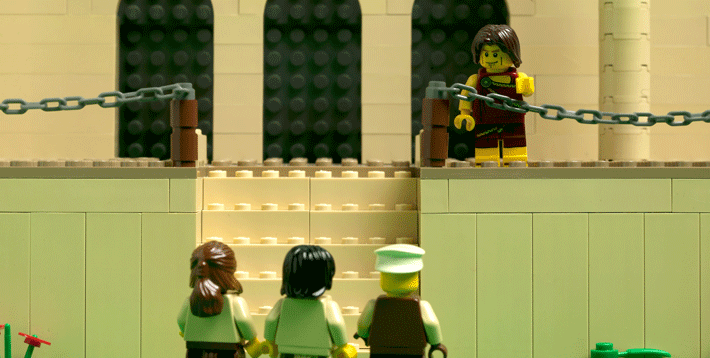
BRUTUS
Be patient till the last.
Romans, countrymen, and lovers, Hear me for my
cause, and be silent that you may hear. Believe me
for mine honor, and have respect to mine honor, that
you may believe. Censure me in your wisdom, and
awake your senses, that you may the better judge.
If there be any in this assembly, any dear friend of
Caesar’s, to him I say that Brutus’ love to Caesar
was no less than his. If then that friend demand
why Brutus rose against Caesar, this is my answer:
not that I loved Caesar less, but that I loved
Rome more. Had you rather Caesar were living and
die all slaves, than that Caesar were dead, to live
all free men? As Caesar loved me, I weep for him;
as he was fortunate, I rejoice at it; as he was
valiant, I honor him: but, as he was ambitious, I
slew him. There is tears for his love; joy for his
fortune; honor for his valor; and death for his
ambition. Who is here so base that would be a
bondman? If any, speak, for him have I offended.
Who is here so rude that would not be a Roman? If
any, speak, for him have I offended. Who is here so
vile that will not love his country? If any, speak,
for him have I offended. I pause for a reply.
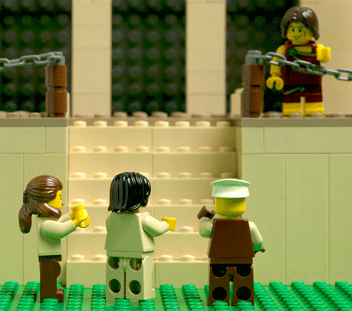
ALL
None, Brutus, none!
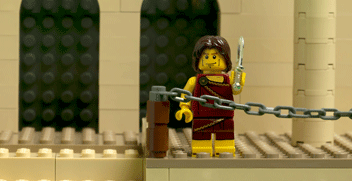
BRUTUS
Then none have I offended. I have done no more to
Caesar than you shall do to Brutus. The question of
his death is enrolled in the Capitol, his glory not
extenuated wherein he was worthy, nor his offences
enforced, for which he suffered death.
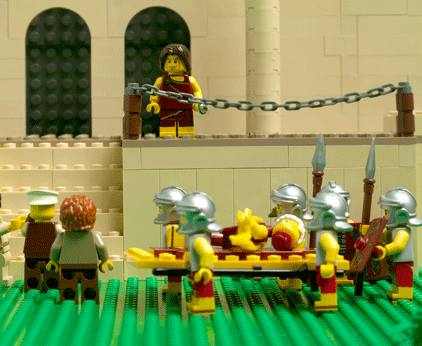
BRUTUS (cont.)
Here comes his body, mourned by Mark Antony, who,
though he had no hand in his death, shall receive
the benefit of his dying, a place in the
commonwealth, as which of you shall not? With this
I depart, that, as I slew my best lover for the
good of Rome, I have the same dagger for myself,
when it shall please my country to need my death.
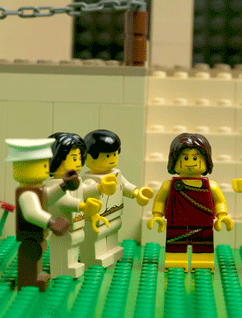
ALL
Live, Brutus, live, live!
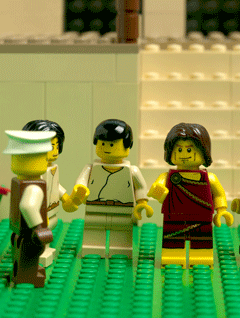
FIRST PLEBEIAN
Bring him with triumph home unto his house.
SECOND PLEBEIAN
Give him a statue with his ancestors.
THIRD PLEBEIAN
Let him be Caesar.
FOURTH PLEBEIAN
Caesar’s better parts
Shall be crowned in Brutus.
FIRST PLEBEIAN
We’ll bring him to his house with shouts and clamors.
BRUTUS
My countrymen—
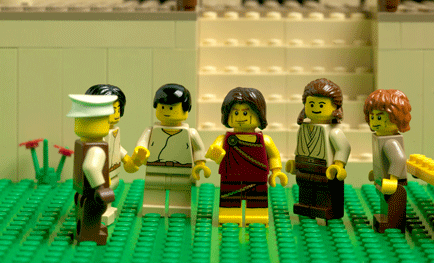
SECOND PLEBEIAN
Peace, silence! Brutus speaks.
FIRST PLEBEIAN
Peace, ho!
BRUTUS
Good countrymen, let me depart alone,
And, for my sake, stay here with Antony.
Do grace to Caesar’s corpse, and grace his speech
Tending to Caesar’s glories, which Mark Antony,
By our permission, is allowed to make.
I do entreat you, not a man depart,
Save I alone, till Antony have spoke.
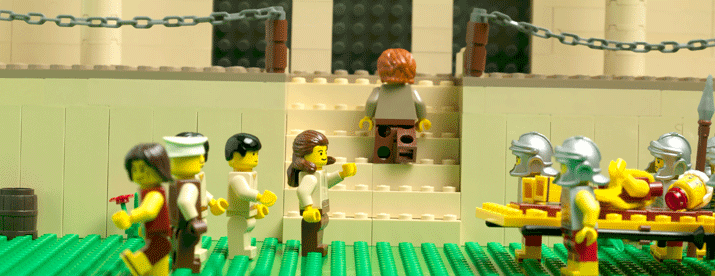
FIRST PLEBEIAN
Stay, ho, and let us hear Mark Antony.
THIRD PLEBEIAN
Let him go up into the public chair.
We’ll hear him. Noble Antony, go up.
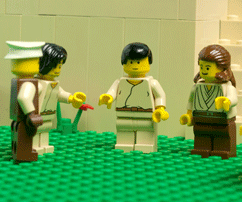
ANTONY
For Brutus’ sake I am beholding to you.
FOURTH PLEBEIAN
What does he say of Brutus?
THIRD PLEBEIAN
He says, for Brutus’ sake,
He finds himself beholding to us all.
FOURTH PLEBEIAN
’Twere best he speak no harm of Brutus here.
FIRST PLEBEIAN
This Caesar was a tyrant.
THIRD PLEBEIAN
Nay, that’s certain.
We are blest that Rome is rid of him.
SECOND PLEBEIAN
Peace! Let us hear what Antony can say.
ANTONY
You gentle Romans—
CITIZENS
Peace, ho! Let us hear him.

ANTONY
Friends, Romans, countrymen, lend me your ears.
I come to bury Caesar, not to praise him.
The evil that men do lives after them;
The good is oft interrèd with their bones.
So let it be with Caesar. The noble Brutus
Hath told you Caesar was ambitious.
If it were so, it was a grievous fault,
And grievously hath Caesar answered it.
Here, under leave of Brutus and the rest—
For Brutus is an honorable man,
So are they all, all honorable men—
Come I to speak in Caesar’s funeral.
He was my friend, faithful and just to me;
But Brutus says he was ambitious,
And Brutus is an honorable man.
He hath brought many captives home to Rome,
Whose ransoms did the general coffers fill.
Did this in Caesar seem ambitious?
When that the poor have cried, Caesar hath wept;
Ambition should be made of sterner stuff.
Yet Brutus says he was ambitious,
And Brutus is an honorable man.
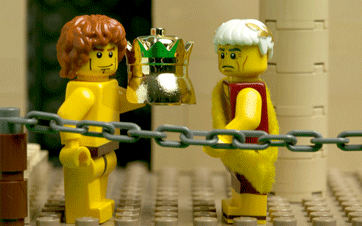
ANTONY (cont.)
You all did see that on the Lupercal
I thrice presented him a kingly crown,
Which he did thrice refuse. Was this ambition?
Yet Brutus says he was ambitious,
And sure he is an honorable man.
I speak not to disprove what Brutus spoke,
But here I am to speak what I do know.
You all did love him once, not without cause.
What cause withholds you then to mourn for him?

O judgment! Thou art fled to brutish beasts,
And men have lost their reason. Bear with me;
My heart is in the coffin there with Caesar,
And I must pause till it come back to me.
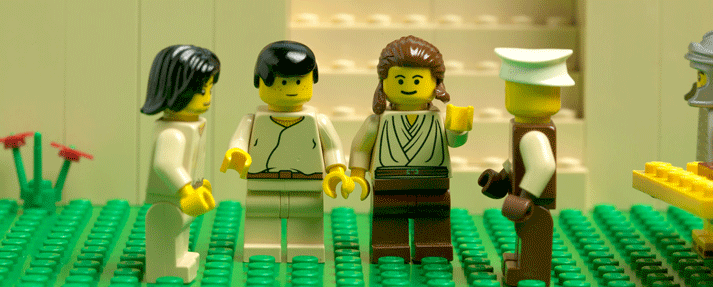
FIRST PLEBEIAN
Methinks there is much reason in his sayings.
SECOND PLEBEIAN
If thou consider rightly of the matter,
Caesar has had great wrong.
THIRD PLEBEIAN
Has he, masters?
I fear there will a worse come in his place.
FOURTH PLEBEIAN
Marked ye his words? He would not take the crown,
Therefore ’tis certain he was not ambitious.
FIRST PLEBEIAN
If it be found so, some will dear abide it.
SECOND PLEBEIAN
Poor soul, his eyes are red as fire with weeping.
THIRD PLEBEIAN
There’s not a nobler man in Rome than Antony.
FOURTH PLEBEIAN
Now mark him. He begins again to speak.
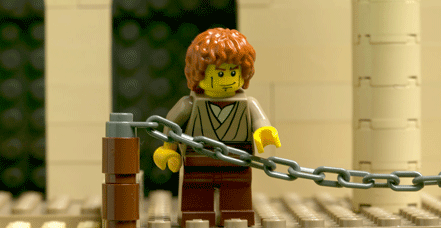
ANTONY
But yesterday the word of Caesar might
Have stood against the world. Now lies he there,
And none so poor to do him reverence.
O masters, if I were disposed to stir
Your hearts and minds to mutiny and rage,
I should do Brutus wrong, and Cassius wrong,
Who, you all know, are honorable men.
I will not do them wrong; I rather choose
To wrong the dead, to wrong myself and you,
Than I will wrong such honorable men.
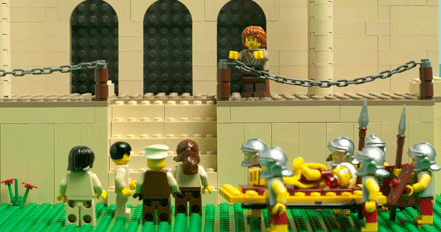
ANTONY (cont.)
But here’s a parchment with the seal of Caesar.
I found it in his closet; ’tis his will.
Let but the commons hear this testament—
Which, pardon me, I do not mean to read—
And they would go and kiss dead Caesar’s wounds
And dip their napkins in his sacred blood,
Yea, beg a hair of him for memory,
And dying, mention it within their wills,
Bequeathing it as a rich legacy
Unto their issue.
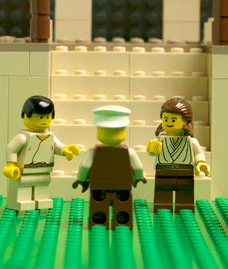
FOURTH PLEBEIAN
We’ll hear the will! Read it, Mark Antony.
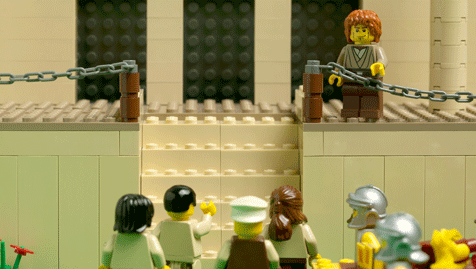
ALL
The will, the will! We will hear Caesar’s will.
ANTONY
Have patience, gentle friends: I must not read it.
It is not meet you know how Caesar loved you.
You are not wood, you are not stones, but men;
And being men, hearing the will of Caesar,
It will inflame you, it will make you mad.
’Tis good you know not that you are his heirs,
For if you should, O, what would come of it?
FOURTH PLEBEIAN
Read the will! We’ll hear it, Antony.
You shall read us the will, Caesar’s will.
ANTONY
Will you be patient? Will you stay awhile?
I have o’ershot myself to tell you of it.
I fear I wrong the honorable men
Whose daggers have stabbed Caesar; I do fear it.
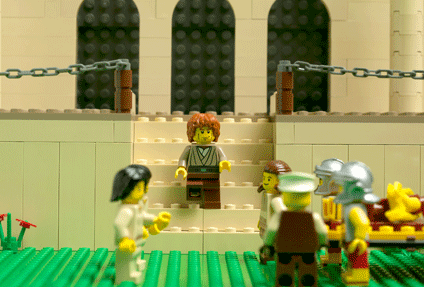
FOURTH PLEBEIAN
They were traitors. “Honorable men”!
ALL
The will! The testament!
SECOND PLEBEIAN
They were villains, murderers. The will! Read the will!
ANTONY
You will compel me then to read the will?
Then make a ring about the corpse of Caesar
And let me show you him that made the will.
Shall I descend? And will you give me leave?
ALL
Come down.
SECOND PLEBEIAN
Descend.
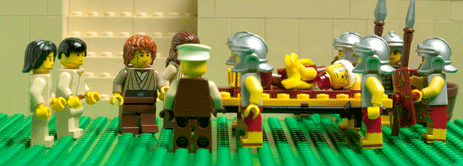
THIRD PLEBEIAN
You shall have leave.
FOURTH PLEBEIAN
A ring; stand round.
FIRST PLEBEIAN
Stand from the hearse. Stand from the body.
SECOND PLEBEIAN
Room for Antony, most noble Antony.
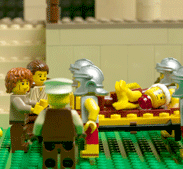
ANTONY
Nay, press not so upon me;
stand farre off.
ALL
Stand back! Room! Bear back!

ANTONY
If you have tears, prepare to shed them now.
You all do know this mantle. I remember
The first time ever Caesar put it on;
’Twas on a summer’s evening in his tent,
That day he overcame the Nervii:
Look, in this place ran Cassius’ dagger through.
See what a rent the envious Casca made.
Through this the well-belovèd Brutus stabbed,
And as he plucked his cursèd steel away,
Mark how the blood of Caesar followed it,
As rushing out of doors to be resolved
If Brutus so unkindly knocked or no;
For Brutus, as you know, was Caesar’s angel.
Judge, O you gods, how dearly Caesar loved him!
This was the most unkindest cut of all;
For when the noble Caesar saw him stab,
Ingratitude, more strong than traitors’ arms,
Quite vanquished him. Then burst his mighty heart,
And in his mantle muffling up his face,
Even at the base of Pompey’s statue,
Which all the while ran blood, great Caesar fell.
O, what a fall was there, my countrymen!
Then I, and you, and all of us fell down,
Whilst bloody treason flourished over us.
O, now you weep, and I perceive you feel
The dint of pity. These are gracious drops.
Kind souls, what weep you when you but behold
Our Caesar’s vesture wounded? Look you here,
Here is himself, marred as you see with traitors.
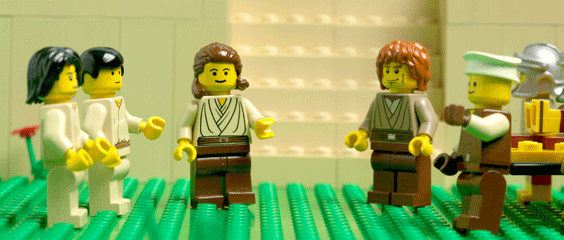
FIRST PLEBEIAN
O piteous spectacle!
SECOND PLEBEIAN
O noble Caesar!
THIRD PLEBEIAN
O woeful day!
FOURTH PLEBEIAN
O traitors, villains!
FIRST PLEBEIAN
O most bloody sight!
SECOND PLEBEIAN
We will be revenged.
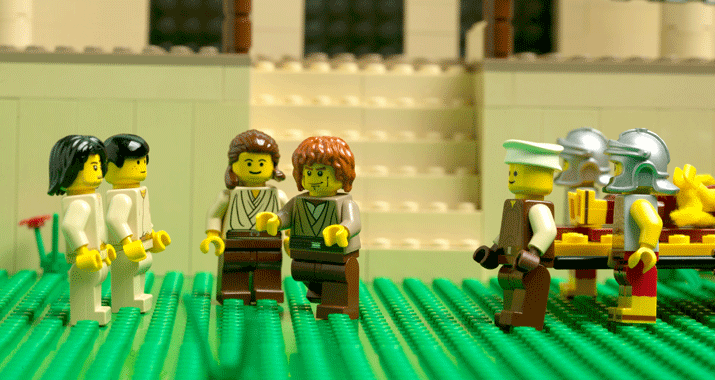
ALL
Revenge! About! Seek! Burn! Fire! Kill! Slay!
Let not a traitor live!
ANTONY
Stay, countrymen.
FIRST PLEBEIAN
Peace there! Hear the noble Antony.
SECOND PLEBEIAN
We’ll hear him, we’ll follow him, we’ll die with him.
ANTONY
Good friends, sweet friends, let me not stir you up
To such a sudden flood of mutiny.
They that have done this deed are honorable.
What private griefs they have, alas, I know not,
That made them do it. They are wise and honorable,
And will no doubt with reasons answer you.
I come not, friends, to steal away your hearts.
I am no orator, as Brutus is,
But, as you know me all, a plain blunt man
That love my friend, and that they know full well
That gave me public leave to speak of him.
For I have neither wit, nor words, nor worth,
Action, nor utterance, nor the power of speech
To stir men’s blood. I only speak right on.
I tell you that which you yourselves do know,
Show you sweet Caesar’s wounds, poor poor dumb mouths,
And bid them speak for me. But were I Brutus,
And Brutus Antony, there were an Antony
Would ruffle up your spirits and put a tongue
In every wound of Caesar that should move
The stones of Rome to rise and mutiny.
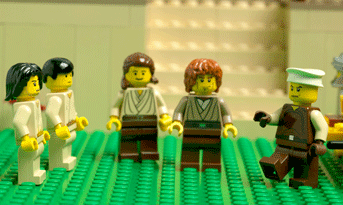
ALL
We’ll mutiny.
FIRST PLEBEIAN
We’ll burn the house of Brutus.
THIRD PLEBEIAN
Away, then! Come, seek the conspirators.
ANTONY
Yet hear me, countrymen. Yet hear me speak.
ALL
Peace, ho! Hear Antony, most noble Antony!
ANTONY
Why, friends, you go to do you know not what.
Wherein hath Caesar thus deserved your loves?
Alas, you know not. I must tell you then:
You have forgot the will I told you of.
ALL
Most true. The will! Let’s stay and hear the will.
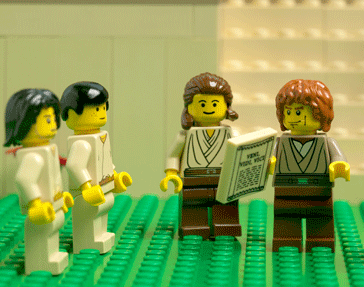
ANTONY
Here is the will, and under Caesar’s seal.
To every Roman citizen he gives,
To every several man, seventy-five drachmas.
SECOND CITIZEN
Most noble Caesar! We’ll revenge his death.
THIRD CITIZEN
O royal Caesar!
ANTONY
Hear me with patience.
ALL
Peace, ho!
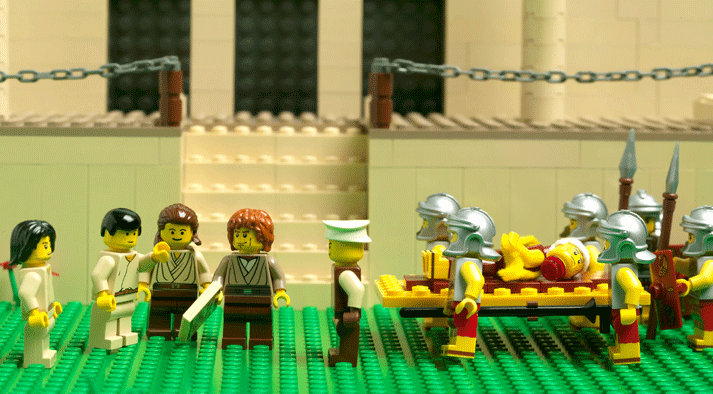
ANTONY
Moreover, he hath left you all his walks,
His private arbors, and new-planted orchards,
On this side Tiber; he hath left them you,
And to your heirs forever—common pleasures,
To walk abroad and recreate yourselves.
Here was a Caesar! When comes such another?
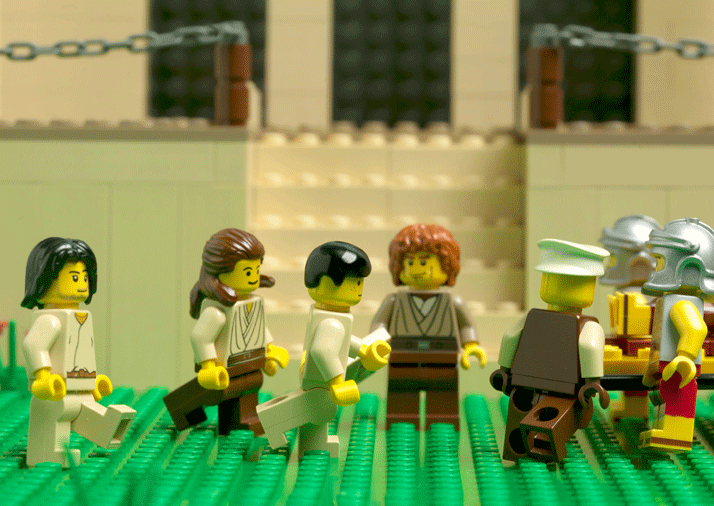
FIRST PLEBEIAN
Never, never! Come, away, away!
We’ll burn his body in the holy place
And with the brands fire the traitors’ houses.
Take up the body.
SECOND PLEBEIAN
Go fetch fire!
THIRD PLEBEIAN
Pluck down benches!
FOURTH PLEBEIAN
Pluck down forms, windows, anything!
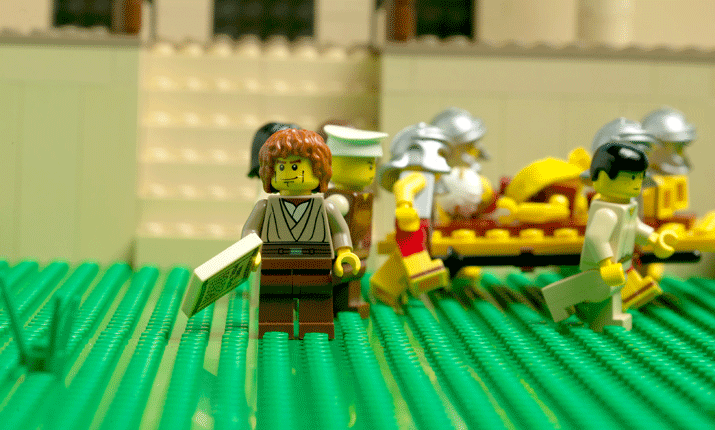
ANTONY
Now let it work. Mischief, thou art afoot,
Take thou what course thou wilt!
ACT III. Scene III (1–38).

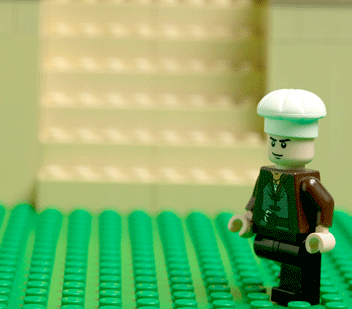
CINNA THE POET
I dreamt tonight that I did feast with Caesar,
And things unlucky charge my fantasy.
I have no will to wander forth of doors,
Yet something leads me forth.
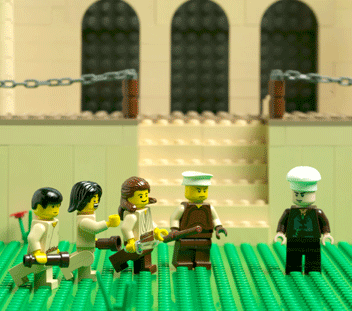
FIRST PLEBEIAN
What is your name?
SECOND PLEBEIAN
Whither are you going?
THIRD PLEBEIAN
Where do you dwell?
FOURTH PLEBEIAN
Are you a married man or a bachelor?

SECOND PLEBEIAN
Answer every man directly.
FIRST PLEBEIAN
Ay, and briefly.
FOURTH PLEBEIAN
Ay, and wisely.
THIRD PLEBEIAN
Ay, and truly, you were best.
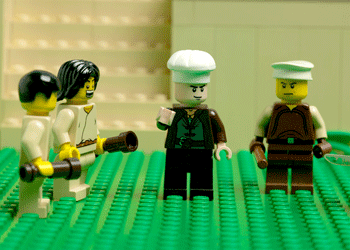
CINNA THE POET
What is my name? Whither am I going? Where do I
dwell? Am I a married man or a bachelor? Then to
answer every man directly and briefly, wisely and
truly: wisely I say, I am a bachelor.
SECOND PLEBEIAN
That’s as much as to say they are fools that marry.
You’ll bear me a bang for that, I fear. Proceed directly.
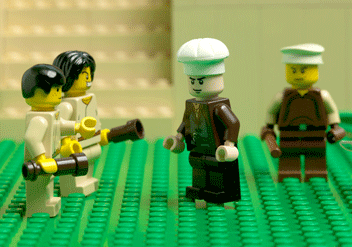
CINNA THE POET
Directly, I am going to Caesar’s funeral.
FIRST PLEBEIAN
As a friend or an enemy?
CINNA THE POET
As a friend.
SECOND PLEBEIAN
That matter is answered directly.
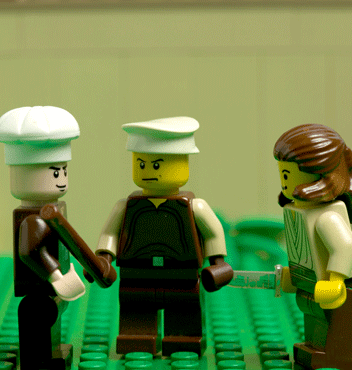
FOURTH PLEBEIAN
For your dwelling—briefly.
CINNA THE POET
Briefly, I dwell by the Capitol.
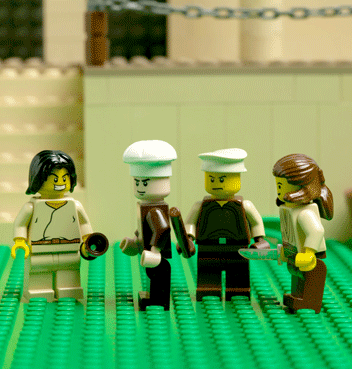
THIRD PLEBEIAN
Your name, sir, truly.
CINNA THE POET
Truly, my name is Cinna.
FIRST PLEBEIAN
Tear him to pieces! He’s a conspirator!
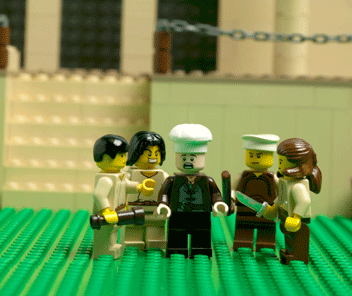
CINNA THE POET
I am Cinna the poet, I am Cinna the poet!
FOURTH PLEBEIAN
Tear him for his bad verses, tear him for his bad verses!
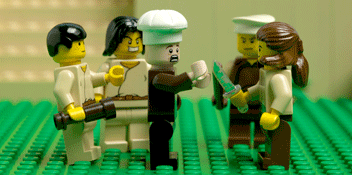
CINNA THE POET
I am not Cinna the conspirator.
FOURTH PLEBEIAN
It is no matter, his name’s Cinna. Pluck but his
name out of his heart, and turn him going.
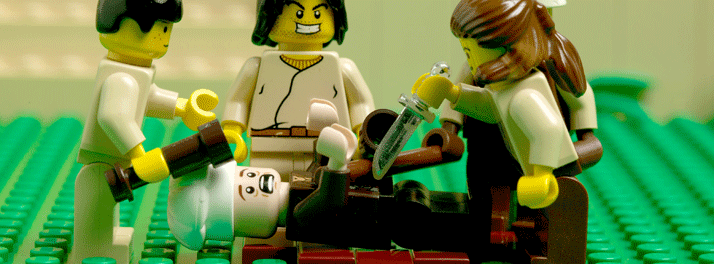
THIRD PLEBEIAN
Tear him, tear him! Come, brands, ho, firebrands!
To Brutus’, to Cassius’; burn all! Some to Decius’
house, and some to Casca’s; some to Ligarius’. Away, go!
ACT II. Scene III (240–307).

Brutus, Cassius, and the other conspirators have fled the violence in Rome and have gathered their armies to prepare to meet their enemies on the battlefield. Antony has allied himself with Caesar’s loyal follower Lepidus, and his nephew Octavius, to form a triumvirate to rule Rome; they are gathering their own armies to fight the rebels.
The mood is somber and tense in the conspirator’s camp: Brutus and Cassius bicker for a time, and they are further moved by sad news: Brutus’s wife Portia has taken her own life, and many other friends have had their lives ended by their own hand or at the command of the triumvirate. They hear that Octavius and Antony march with a large army, and they plan their next actions. Brutus, still convinced of the righteousness of their fight, says they should march to meet their enemy at Philippi and attack before the enemy has a chance. Cassius thinks this is unwise, and suggests they make the enemy chase them and tire themselves out before they try to engage in direct combat. But Brutus says, “Our legions are brim full, our cause is ripe./The enemy increaseth every day;/We, at the height, are ready to decline” (IV.iii.214–217). He decides that they should strike now with their armies strong and well-rested, before Antony and Octavius have time to gather even more powerful allies from Rome and the surrounding countryside.
With this decided, Brutus settles down, until a strange visitor interrupts his sleep.
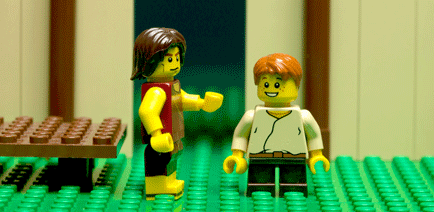
BRUTUS
Farewell, every one.
Give me the gown. Where is thy instrument?
LUCIUS
Here in the tent.
BRUTUS
What, thou speak’st drowsily!
Poor knave, I blame thee not; thou art o’er-watched.
Call Claudius and some other of my men;
I’ll have them sleep on cushions in my tent.
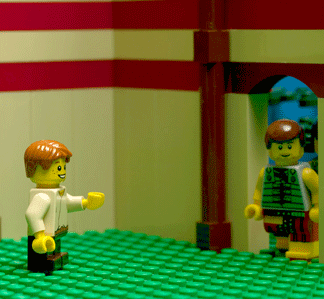
LUCIUS
Varro and Claudius!
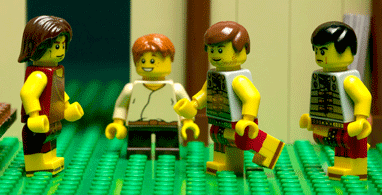
VARRO
Calls my lord?
BRUTUS
I pray you, sirs, lie in my tent and sleep.
It may be I shall raise you by and by
On business to my brother Cassius.
VARRO
So please you, we will stand and watch your pleasure.
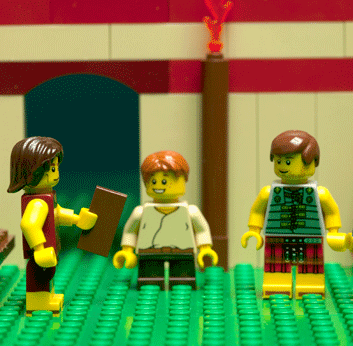
BRUTUS
I will not have it so. Lie down, good sirs.
It may be I shall otherwise bethink me.
Look, Lucius, here’s the book I sought for so;
I put it in the pocket of my gown.
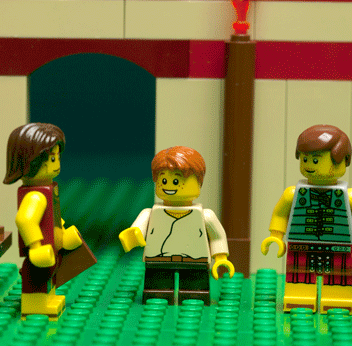
LUCIUS
I was sure your Lordship did not give it me.
BRUTUS
Bear with me, good boy, I am much forgetful.
Canst thou hold up thy heavy eyes awhile
And touch thy instrument a strain or two?
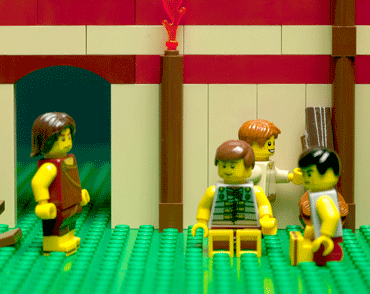
LUCIUS
Ay, my lord, an’t please you.
BRUTUS
It does, my boy.
I trouble thee too much, but thou art willing.
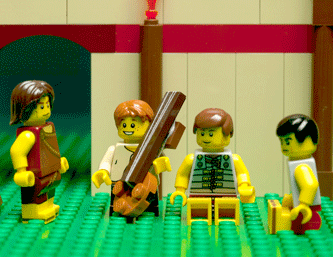
LUCIUS
It is my duty, sir.
BRUTUS
I should not urge thy duty past thy might;
I know young bloods look for a time of rest.
LUCIUS
I have slept, my lord, already.
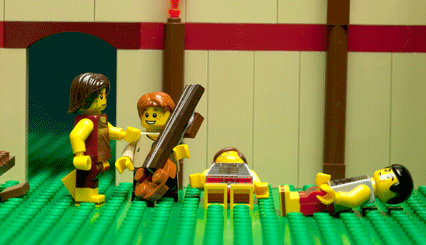
BRUTUS
It was well done, and thou shalt sleep again;
I will not hold thee long. If I do live,
I will be good to thee.
This is a sleepy tune. O murd’rous slumber,
Layest thou thy leaden mace upon my boy,
That plays thee music? Gentle knave, good night;
I will not do thee so much wrong to wake thee.
If thou dost nod, thou break’st thy instrument;
I’ll take it from thee. And, good boy, good night.
Let me see, let me see; is not the leaf turned down
Where I left reading? Here it is, I think.
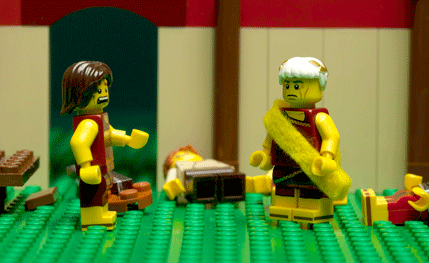
BRUTUS (cont.)
How ill this taper burns! Ha! Who comes here?
I think it is the weakness of mine eyes
That shapes this monstrous apparition.
It comes upon me.—Art thou any thing?
Art thou some god, some angel, or some devil,
That mak’st my blood cold and my hair to stare?
Speak to me what thou art.
GHOST
Thy evil spirit, Brutus.
BRUTUS
Why com’st thou?
GHOST
To tell thee thou shalt see me at Philippi.
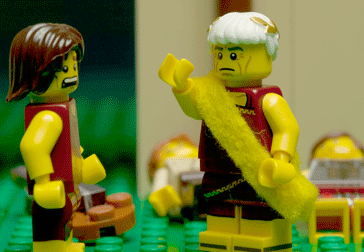
BRUTUS
Well; then I shall see thee again?
GHOST
Ay, at Philippi.
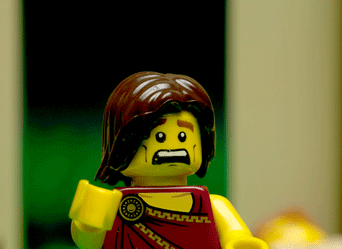
BRUTUS
Why, I will see thee at Philippi, then.
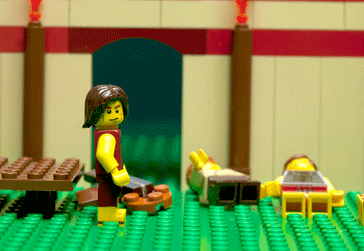
BRUTUS (cont.)
Now I have taken heart, thou vanishest.
Ill spirit, I would hold more talk with thee.—
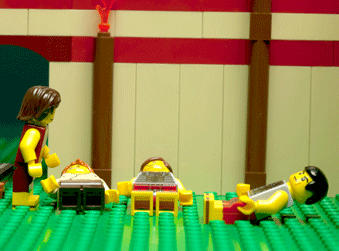
BRUTUS (cont.)
Boy, Lucius! Varro! Claudius! Sirs, awake!
Claudius!
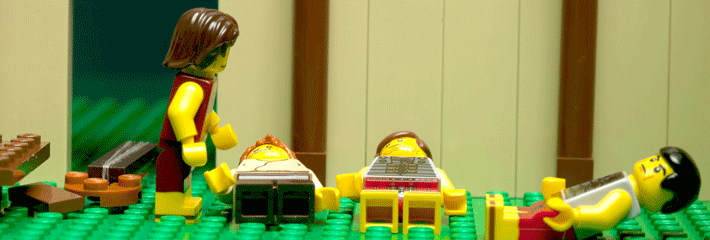
LUCIUS
The strings, my lord, are false.
BRUTUS
He thinks he still is at his instrument.—
Lucius, awake!
LUCIUS
My lord?
BRUTUS
Didst thou dream, Lucius, that thou so cried’st out?
LUCIUS
My lord, I do not know that I did cry.
BRUTUS
Yes, that thou didst. Didst thou see anything?
LUCIUS
Nothing, my lord.
BRUTUS
Sleep again, Lucius.
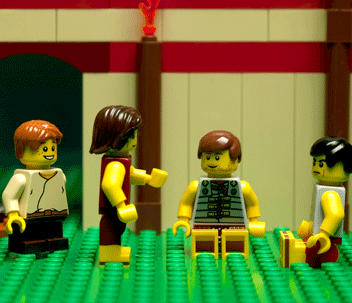
BRUTUS (cont.)
Sirrah Claudius!
Fellow thou, awake!
VARRO
My lord?
CLAUDIUS
My lord?
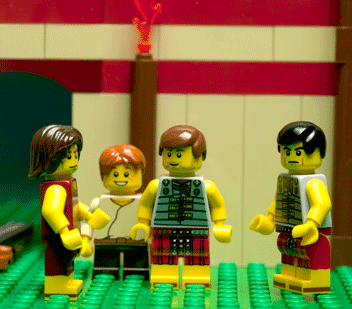
BRUTUS (cont.)
Sirrah Claudius!
Fellow thou, awake!
VARRO
My lord?
CLAUDIUS
My lord?
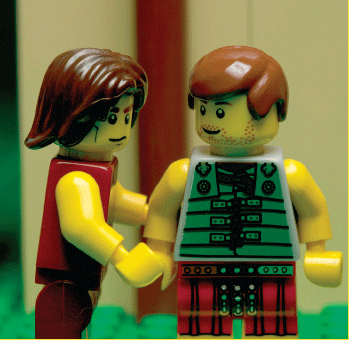
BRUTUS
Ay. Saw you anything?
VARRO
No, my lord, I saw nothing.
CLAUDIUS
Nor I, my lord.
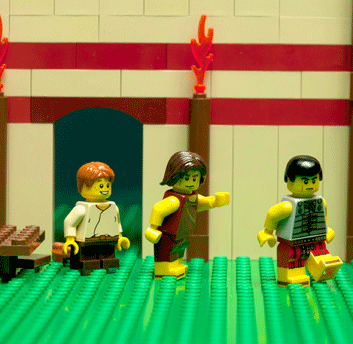
BRUTUS
Go and commend me to my brother Cassius.
Bid him set on his powers betimes before,
And we will follow.
VARRO AND CLAUDIUS
It shall be done, my lord.
ACT V. Scene I (21–66).

The armies meet at Philippi and prepare for battle . . .
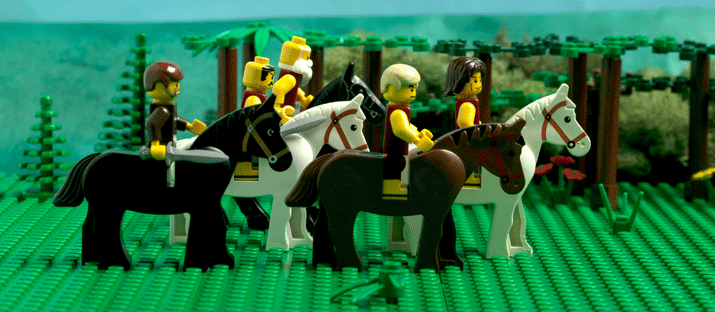
BRUTUS
They stand and would have parley.
CASSIUS
Stand fast, Titinius. We must out and talk.
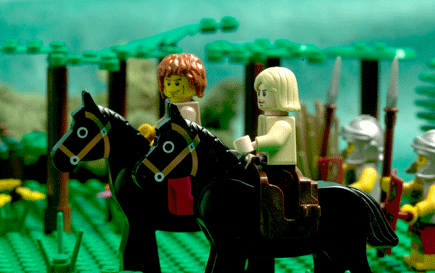
OCTAVIUS
Mark Antony, shall we give sign of battle?
ANTONY
No, Caesar, we will answer on their charge.
Make forth. The generals would have some words.
OCTAVIUS
Stir not until the signal.
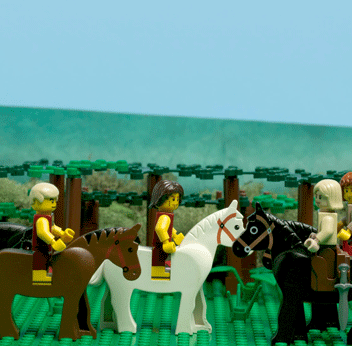
BRUTUS
Words before blows. Is it so, countrymen?
OCTAVIUS
Not that we love words better, as you do.
BRUTUS
Good words are better than bad strokes, Octavius.
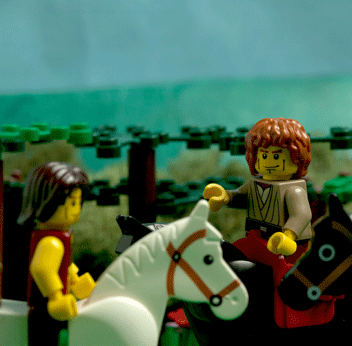
ANTONY
In your bad strokes, Brutus, you give good words.
Witness the hole you made in Caesar’s heart,
Crying “Long live! Hail, Caesar!”
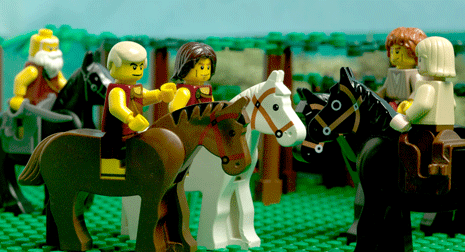
CASSIUS
Antony,
The posture of your blows are yet unknown;
But for your words, they rob the Hybla bees,
And leave them honeyless.
ANTONY
Not stingless too?
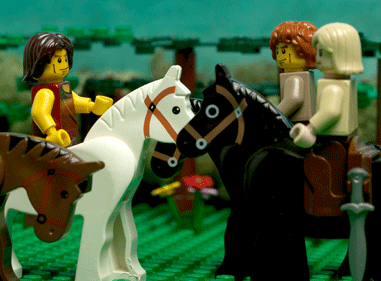
BRUTUS
O, yes, and soundless too.
For you have stol’n their buzzing, Antony,
And very wisely threat before you sting.
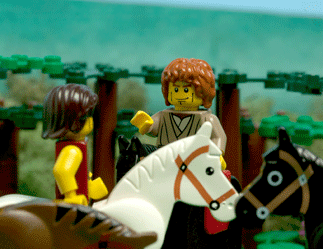
ANTONY
Villains, you did not so when your vile daggers
Hacked one another in the sides of Caesar.
You showed your teeth like apes, and fawned like hounds,
And bowed like bondmen, kissing Caesar’s feet,
Whilst damnèd Casca, like a cur, behind,
Struck Caesar on the neck. O you flatterers!
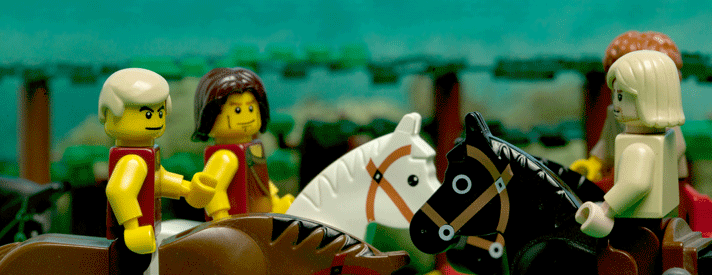
CASSIUS
Flatterers? Now, Brutus, thank yourself!
This tongue had not offended so today
If Cassius might have ruled.
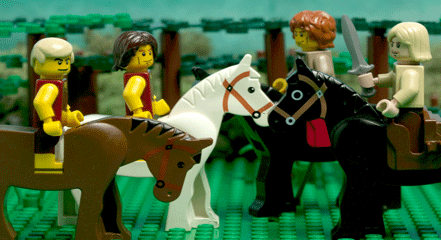
OCTAVIUS
Come, come, the cause. If arguing make us sweat,
The proof of it will turn to redder drops.
Look, I draw a sword against conspirators.
When think you that the sword goes up again?
Never, till Caesar’s three-and-thirty wounds
Be well avenged, or till another Caesar
Have added slaughter to the sword of traitors.
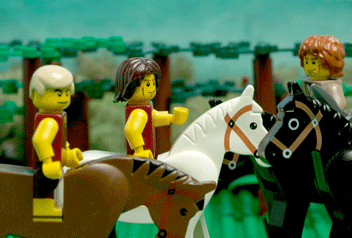
BRUTUS
Caesar, thou canst not die by traitors’ hands,
Unless thou bring’st them with thee.
OCTAVIUS
So I hope.
I was not born to die on Brutus’ sword.
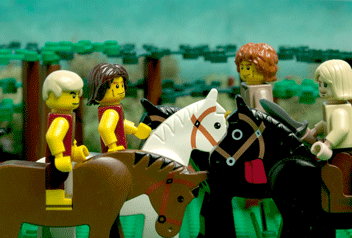
BRUTUS
O, if thou wert the noblest of thy strain,
Young man, thou couldst not die more honorable.
CASSIUS
A peevish schoolboy, worthless of such honor,
Joined with a masker and a reveler!
ANTONY
Old Cassius still!
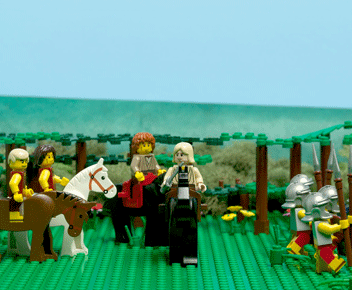
OCTAVIUS
Come, Antony, away!—
Defiance, traitors, hurl we in your teeth.
If you dare fight today, come to the field;
If not, when you have stomachs.
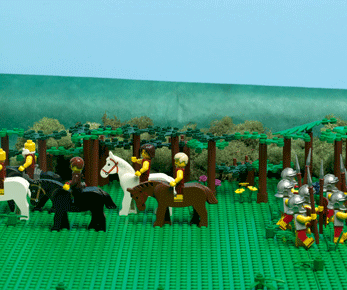
ACT V. Scene II (1–6).

Before they depart to lead their armies in battle, Brutus and Cassius meet once more. Cassius is still reluctant; he clearly expects them to fail, and he declares that he will end his own life before he will be taken captive. Brutus makes no such promises but calls it “cowardly and vile” to end your own life. Brutus is hardly more optimistic than Cassius, as he ends their meeting saying “Oh, that a man might know/The end of this day’s business ere it come!/But it sufficeth that the day will end,/And then the end is known” (V.i.124–127).
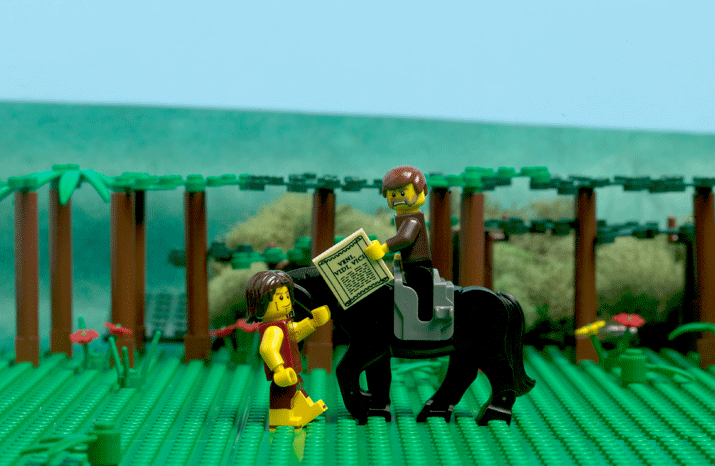
BRUTUS
Ride, ride, Messala, ride, and give these bills
Unto the legions on the other side.
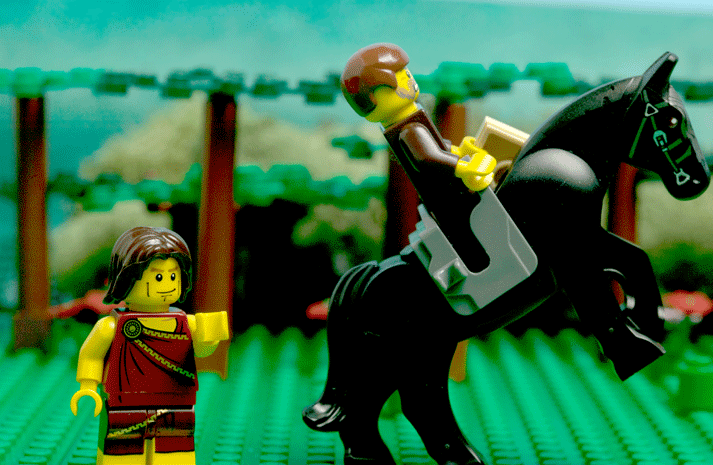
BRUTUS (cont.)
Let them set on at once; for I perceive
But cold demeanor in Octavius’ wing,
And sudden push gives them the overthrow.
Ride, ride, Messala! Let them all come down.
ACT V. Scene III (1–110).

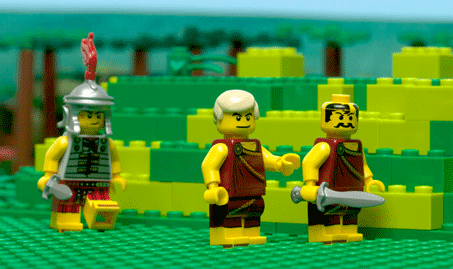
CASSIUS
O, look, Titinius, look, the villains fly!
Myself have to mine own turned enemy.
This ensign here of mine was turning back;
I slew the coward and did take it from him.
TITINIUS
O Cassius, Brutus gave the word too early,
Who, having some advantage on Octavius,
Took it too eagerly. His soldiers fell to spoil,
Whilst we by Antony are all enclosed.
PINDARUS
Fly further off, my lord, fly further off!
Mark Antony is in your tents, my lord.
Fly, therefore, noble Cassius, fly far off.
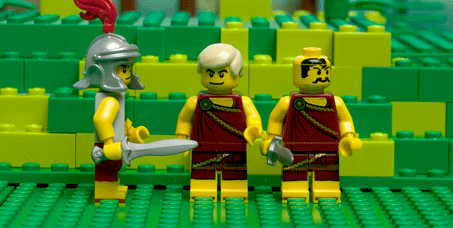
CASSIUS
This hill is far enough. Look, look, Titinius:
Are those my tents where I perceive the fire?
TITINIUS
They are, my lord.
CASSIUS
Titinius, if thou lovest me,
Mount thou my horse, and hide thy spurs in him
Till he have brought thee up to yonder troops
And here again, that I may rest assured
Whether yond troops are friend or enemy.
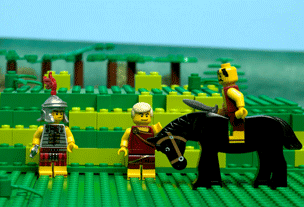
TITINIUS
I will be here again even with a thought.
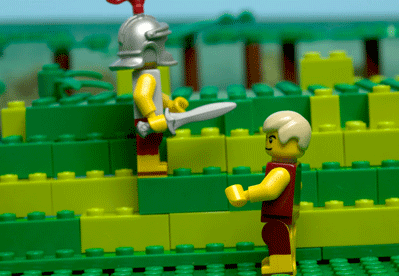
CASSIUS
Go, Pindarus, get higher on that hill.
My sight was ever thick. Regard Titinius,
And tell me what thou not’st about the field.
This day I breathèd first. Time is come round,
And where I did begin, there shall I end.
My life is run his compass.—Sirrah, what news?
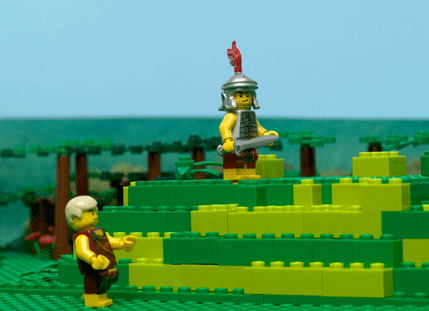
PINDARUS
O my lord!
CASSIUS
What news?
PINDARUS
Titinius is enclosèd round about
With horsemen, that make to him on the spur,
Yet he spurs on. Now they are almost on him.
Now, Titinius! Now some light. O, he lights too.
He’s ta’en. And, hark! They shout for joy.
CASSIUS
Come down, behold no more.
O, coward that I am, to live so long
To see my best friend ta’en before my face!
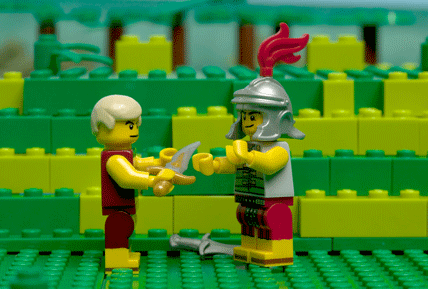
CASSIUS (cont.)
Come hither, sirrah.
In Parthia did I take thee prisoner,
And then I swore thee, saving of thy life,
That whatsoever I did bid thee do
Thou shouldst attempt it. Come now, keep thine oath;
Now be a freeman, and with this good sword,
That ran through Caesar’s bowels, search this bosom.
Stand not to answer. Here, take thou the hilts,
And, when my face is covered, as ’tis now,
Guide thou the sword.
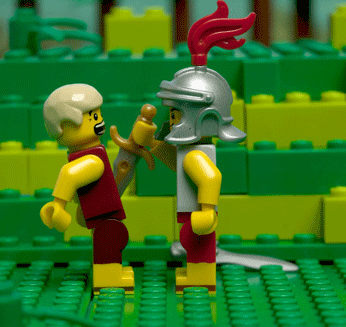
CASSIUS (cont.)
Caesar, thou art revenged,
Even with the sword that killed thee.
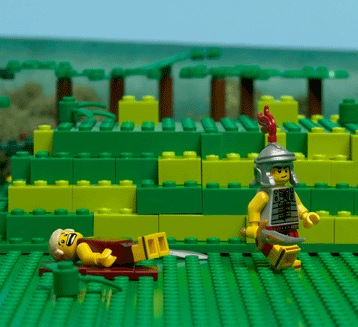
PINDARUS
So, I am free, yet would not so have been,
Durst I have done my will. O Cassius!
Far from this country Pindarus shall run,
Where never Roman shall take note of him.
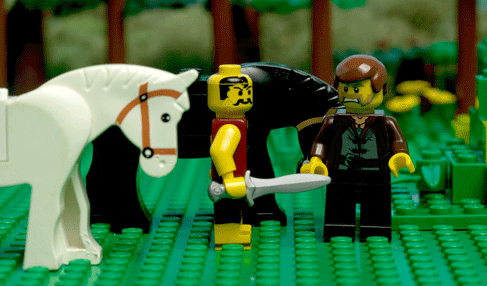
MESSALA
It is but change, Titinius; for Octavius
Is overthrown by noble Brutus’ power,
As Cassius’ legions are by Antony.
TITINIUS
These tidings will well comfort Cassius.
MESSALA
Where did you leave him?
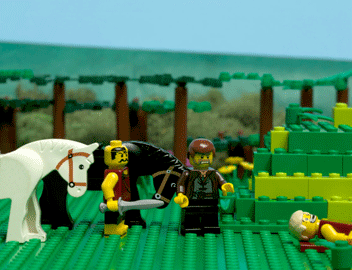
TITINIUS
All disconsolate,
With Pindarus his bondman, on this hill.
MESSALA
Is not that he that lies upon the ground?
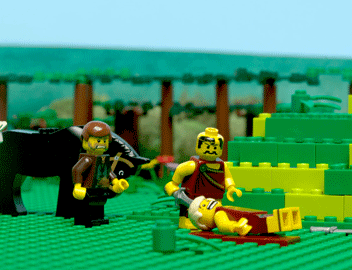
TITINIUS
He lies not like the living. O my heart!
MESSALA
Is not that he?
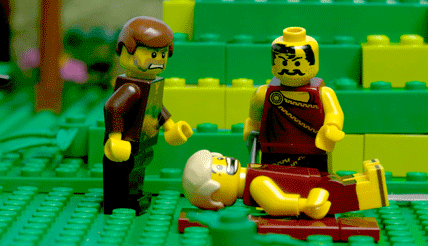
TITINIUS
No, this was he, Messala,
But Cassius is no more. O setting sun,
As in thy red rays thou dost sink tonight,
So in his red blood Cassius’ day is set.
The sun of Rome is set. Our day is gone;
Clouds, dews, and dangers come; our deeds are done!
Mistrust of my success hath done this deed.
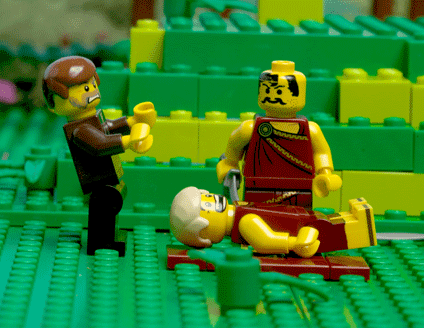
MESSALA
Mistrust of good success hath done this deed.
O hateful Error, Melancholy’s child,
Why dost thou show to the apt thoughts of men
The things that are not? O Error, soon conceived,
Thou never com’st unto a happy birth,
But kill’st the mother that engendered thee!
TITINIUS
What, Pindarus! Where art thou, Pindarus?
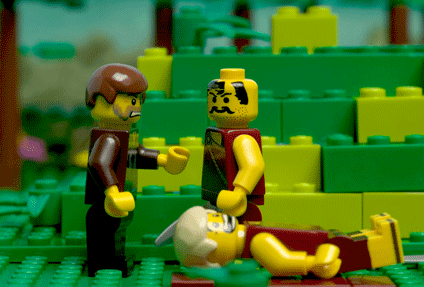
MESSALA
Seek him, Titinius, whilst I go to meet
The noble Brutus, thrusting this report
Into his ears. I may say “thrusting” it,
For piercing steel and darts envenomèd
Shall be as welcome to the ears of Brutus
As tidings of this sight.
TITINIUS
Hie you, Messala,
And I will seek for Pindarus the while.
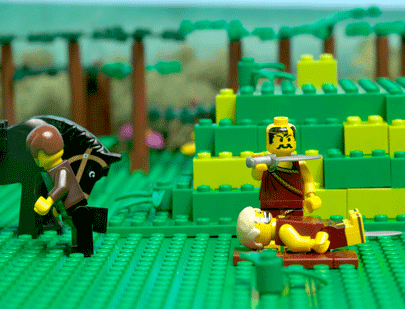
TITINIUS (cont.)
Why didst thou send me forth, brave Cassius?
Did I not meet thy friends? And did not they
Put on my brows this wreath of victory
And bid me give it thee? Didst thou not hear their shouts?
Alas, thou hast misconstrued everything.
But, hold thee, take this garland on thy brow.
Thy Brutus bid me give it thee, and I
Will do his bidding. Brutus, come apace
And see how I regarded Caius Cassius.
By your leave, gods! This is a Roman’s part.
Come, Cassius’ sword, and find Titinius’ heart.
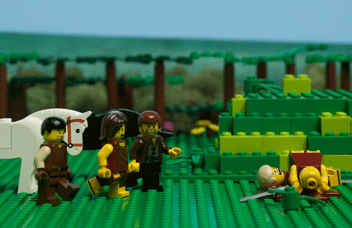
BRUTUS
Where, where, Messala, doth his body lie?
MESSALA
Lo, yonder, and Titinius mourning it.
BRUTUS
Titinius’ face is upward.
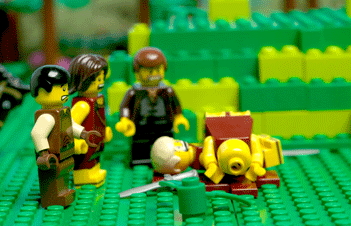
CATO
He is slain.
BRUTUS
O Julius Caesar, thou art mighty yet!
Thy spirit walks abroad and turns our swords
In our own proper entrails.
CATO
Brave Titinius!
Look, whe’er he have not crowned dead Cassius!
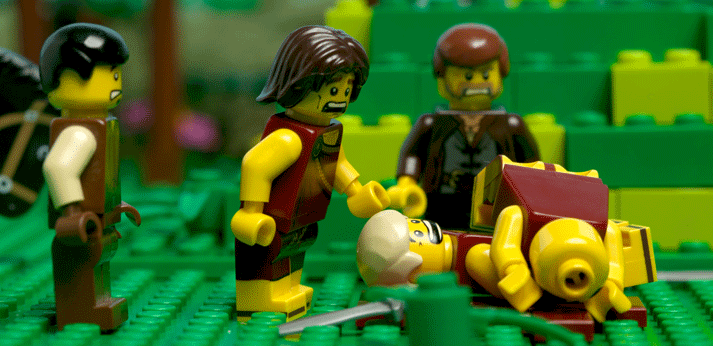
BRUTUS
Are yet two Romans living such as these?
The last of all the Romans, fare thee well!
It is impossible that ever Rome
Should breed thy fellow. Friends, I owe more tears
To this dead man than you shall see me pay.—
I shall find time, Cassius, I shall find time.—
Come, therefore, and to Thasos send his body.
His funerals shall not be in our camp,
Lest it discomfort us. Lucilius, come,
And come, young Cato, let us to the field.
Labeo and Flavius, set our battles on.
’Tis three o’clock; and, Romans, yet ere night
We shall try fortune in a second fight.
ACT V. Scene V (1–51).

Cassius is dead, but Brutus and his men fight bravely on. More friends are killed, and others are captured by Antony and Octavius, but Brutus is able to flee, though his enemies follow closely behind and his friends are dead and gone, save a few remaining loyal servants.
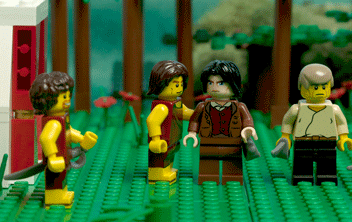
BRUTUS
Come, poor remains of friends, rest on this rock.
CLITUS
Statilius showed the torchlight, but, my lord,
He came not back. He is or ta’en or slain.
BRUTUS
Sit thee down, Clitus. Slaying is the word.
It is a deed in fashion. Hark thee, Clitus.
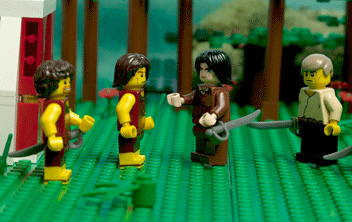
CLITUS
What, I, my lord? No, not for all the world.
BRUTUS
Peace then. No words.
CLITUS
I’ll rather kill myself.
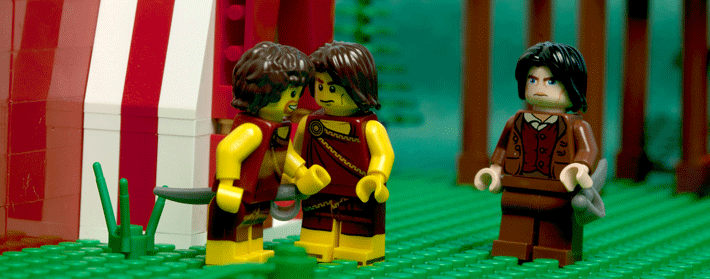
BRUTUS
Hark thee, Dardanius.
DARDANIUS
Shall I do such a deed?
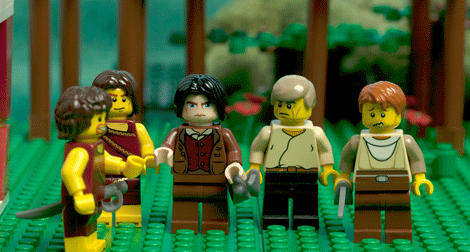
CLITUS
O Dardanius!
DARDANIUS
O Clitus!
CLITUS
What ill request did Brutus make to thee?

DARDANIUS
To kill him, Clitus. Look, he meditates.
CLITUS
Now is that noble vessel full of grief,
That it runs over even at his eyes.
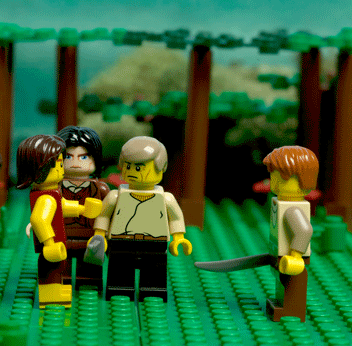
BRUTUS
Come hither, good Volumnius. List a word.
VOLUMNIUS
What says my lord?
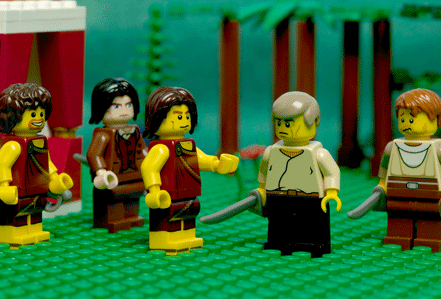
BRUTUS
Why, this, Volumnius:
The ghost of Caesar hath appeared to me
Two several times by nigh—at Sardis once,
And this last night here in Philippi fields.
I know my hour is come.
VOLUMNIUS
Not so, my lord.
BRUTUS
Nay, I am sure it is, Volumnius.
Thou see’st the world, Volumnius, how it goes;
Our enemies have beat us to the pit.
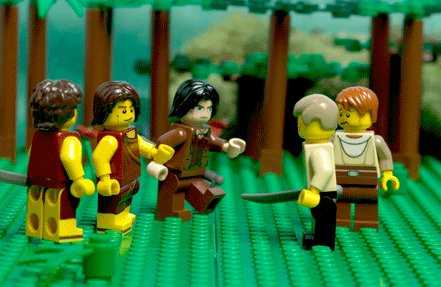
BRUTUS (cont.)
It is more worthy to leap in ourselves
Than tarry till they push us. Good Volumnius,
Thou know’st that we two went to school together.
Even for that our love of old, I prithee,
Hold thou my sword hilts whilst I run on it.
VOLUMNIUS
That’s not an office for a friend, my lord.
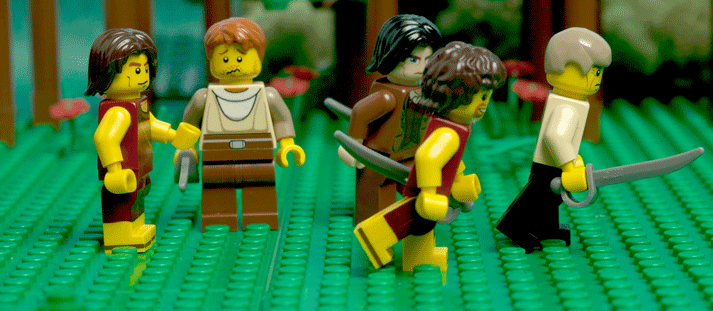
CLITUS
Fly, fly, my lord! There is no tarrying here.
BRUTUS
Farewell to you, and you, and you, Volumnius.
Strato, thou hast been all this while asleep;
Farewell to thee too, Strato. Countrymen,
My heart doth joy that yet in all my life
I found no man but he was true to me.
I shall have glory by this losing day
More than Octavius and Mark Antony
By this vile conquest shall attain unto.
So fare you well at once, for Brutus’ tongue
Hath almost ended his life’s history.
Night hangs upon mine eyes; my bones would rest,
That have but labored to attain this hour.
CLITUS
Fly, my lord, fly.
BRUTUS
Hence, I will follow.
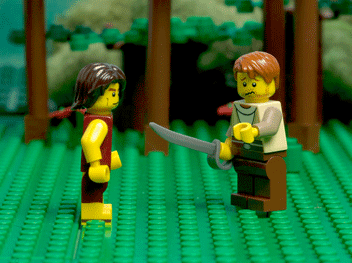
BRUTUS (cont.)
I prithee, Strato, stay thou by thy lord.
Thou art a fellow of a good respect;
Thy life hath had some smatch of honor in it.
Hold then my sword, and turn away thy face,
While I do run upon it. Wilt thou, Strato?
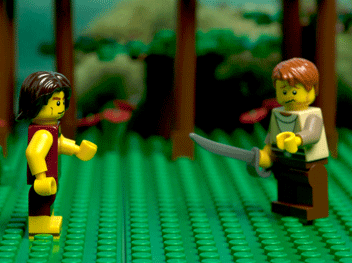
STRATO
Give me your hand first. Fare you well, my lord.
BRUTUS
Farewell, good Strato.
Caesar, now be still.
I killed not thee with half so good a will.
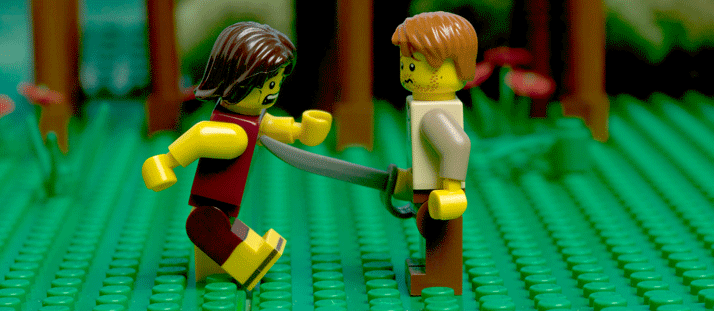
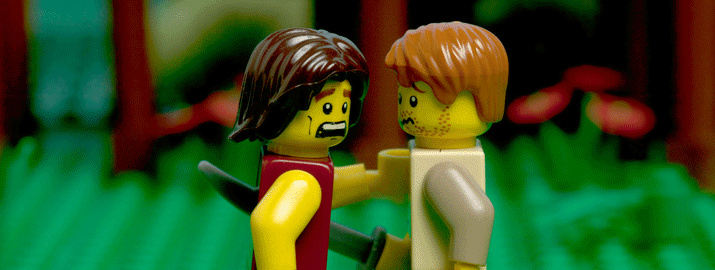
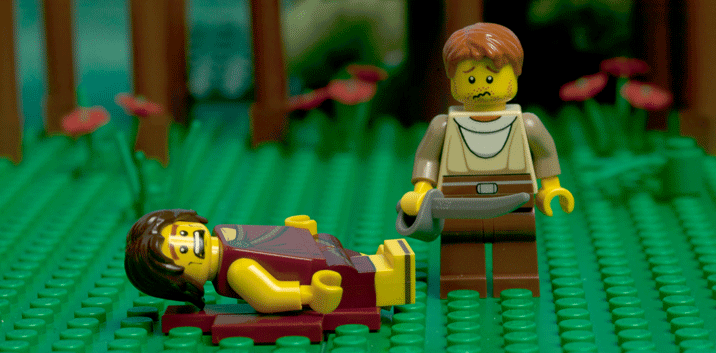
ACT V. Scene V (68–81).

The enemy arrives at Brutus’s camp too late to find him alive. The battle is ended but much has been lost. Antony takes a moment to speak over Brutus’s body.
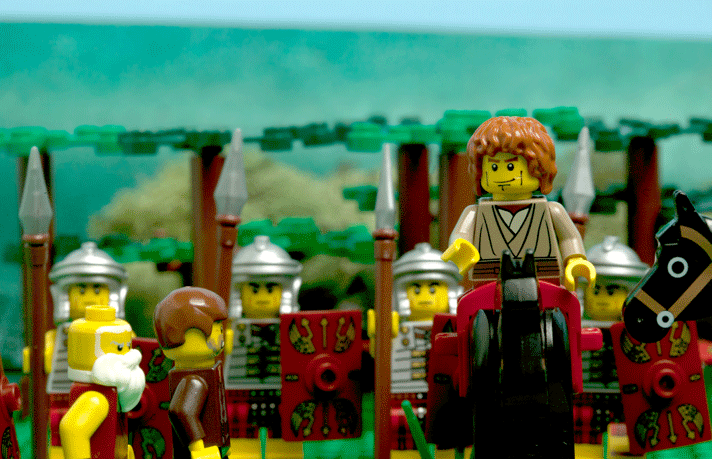
ANTONY
This was the noblest Roman of them all.
All the conspirators save only he
Did that they did in envy of great Caesar;
He only in a general honest thought
And common good to all made one of them.
His life was gentle, and the elements
So mixed in him that Nature might stand up
And say to all the world, “This was a man!”
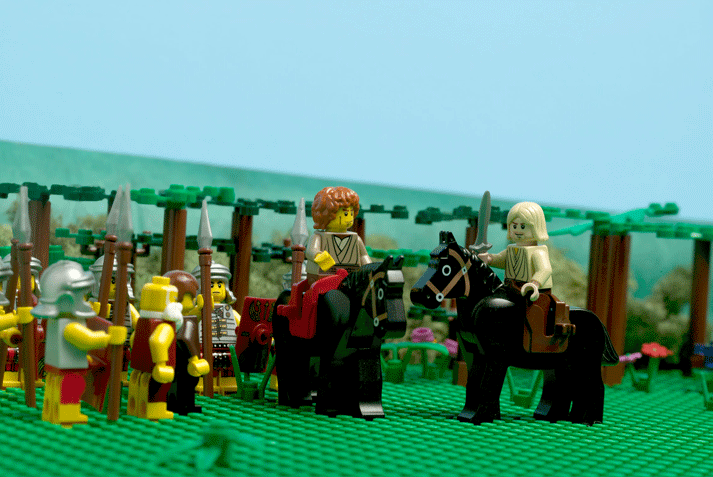
OCTAVIUS
According to his virtue let us use him,
With all respect and rites of burial.
Within my tent his bones tonight shall lie,
Most like a soldier, ordered honorably.
So call the field to rest, and let’s away
To part the glories of this happy day.